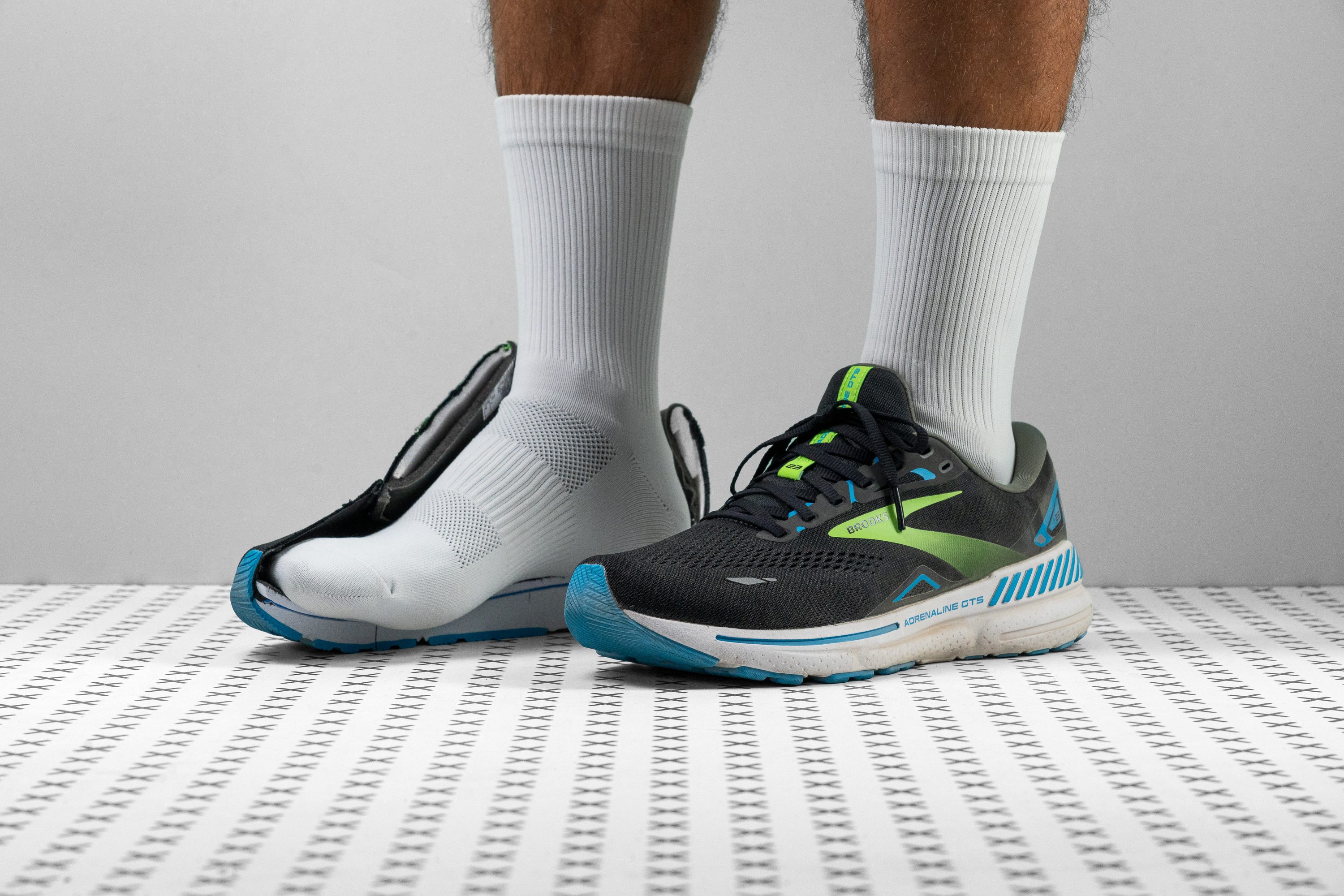Our verdict
- Top pick in best stability running shoes (2023)
Pros
- Excellent stability without being intrusive
- Ideal for easy miles
- Specifically designed for heel strikers
- Outstanding breathability
- Availability in narrow and wide sizes
- Capable of handling tempo paces
- Not expensive at all
- Not expensive at all
Cons
- The engineered mesh upper lacks durability
- Lacks cushion for forefoot strikers
Audience verdict
- Top 29% in Brooks running shoes
- Top 29% in running shoes for walking
- Top 9% most popular running shoes
Comparison
The most similar running shoes compared
+ + Add a shoe | |||||
|---|---|---|---|---|---|
| Audience score | 89 Great! | 85 Good! | 87 Great! | 83 Good! | |
| Price | £135 | £140 | £110 | £160 | |
| Pace | Daily running | Daily running | Daily running | Daily running | |
| Shock absorption | Moderate | Moderate | Moderate | Low | |
| Energy return | Low | Low | High | Low | |
| Traction | High | High | - | Moderate | |
| Arch support | Stability | Stability | Stability | Stability | |
| Weight lab Weight brand | 10.1 oz / 286g 10.4 oz / 294g | 10.3 oz / 291g 10 oz / 283g | 10.3 oz / 293g 10.5 oz / 297g | 11.6 oz / 329g 11.3 oz / 320g | |
| Drop lab Drop brand | 12.6 mm 12.0 mm | 13.5 mm 12.0 mm | 9.8 mm 10.0 mm | 7.9 mm 10.0 mm | |
| Strike pattern | Heel | Heel | HeelMid/forefoot | Mid/forefoot | |
| Size | True to size | Slightly small | True to size | True to size | |
| Midsole softness | Soft | Balanced | Firm | Balanced | |
| Difference in midsole softness in cold | Big | Small | Small | Normal | |
| Toebox durability | Bad | Decent | Decent | Good | |
| Heel padding durability | Good | Good | Good | Good | |
| Outsole durability | Good | Good | Bad | Good | |
| Breathability | Breathable | Moderate | Warm | Moderate | |
| Width / fit | Medium | Medium | Medium | Narrow | |
| Toebox width | Medium | Medium | Wide | Medium | |
| Stiffness | Moderate | Moderate | Stiff | Moderate | |
| Torsional rigidity | Stiff | Stiff | Moderate | Stiff | |
| Heel counter stiffness | Stiff | Stiff | Moderate | Moderate | |
| Heel lab Heel brand | 34.1 mm 36.0 mm | 39.0 mm 39.0 mm | 32.9 mm 31.0 mm | 33.2 mm 31.0 mm | |
| Forefoot lab Forefoot brand | 21.5 mm 24.0 mm | 25.5 mm 27.0 mm | 23.1 mm 21.0 mm | 25.3 mm 21.0 mm | |
| Widths available | NarrowNormalWideX-Wide | NarrowNormalWideX-Wide | Normal | Normal | |
| Orthotic friendly | ✓ | ✓ | ✓ | ✓ | |
| Season | SummerAll seasons | All seasons | All seasons | All seasons | |
| Removable insole | ✓ | ✓ | ✓ | ✓ | |
| Ranking | #226 Top 34% | #213 Bottom 44% | #174 Top 46% | #259 Bottom 32% | |
| Popularity | #58 Top 9% | #6 Top 2% | #354 Bottom 7% | #144 Top 38% |
Who should buy
In our view, the Brooks Adrenaline GTS 23 is a fantastic choice for:
- Mild overpronators who need a running shoe with more support than the average daily trainer.
- Midfoot or heel strikers seeking a workhorse with a traditional fit, steep heel-to-toe drop, and a cushioned heel.
- Fans of Brooks looking for a reliable shoe that can handle easy and aerobic runs on various surfaces.
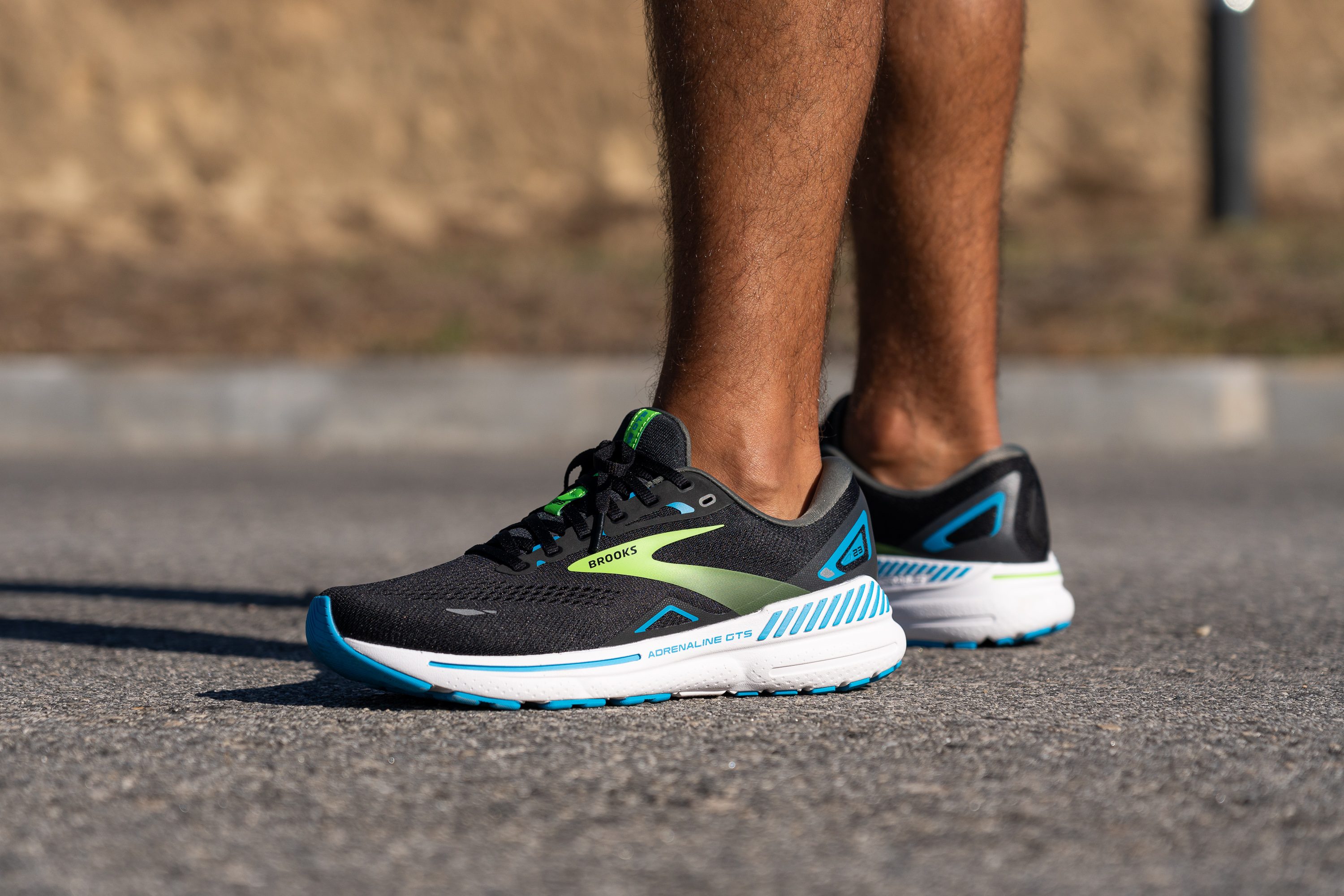
Who should NOT buy
Those with a forefoot strike might find the 12-mm heel-to-toe drop of some shoes too steep and should consider the Saucony Guide 16. In our experience, another option that has a similar high drop but adds extra foam in the forefoot is the Brooks Glycerin GTS 20. We think these options cater better to such specific needs.
Two other groups that might want to explore alternatives are runners who prefer firm midsoles for additional stability. Based on our tests, the On Cloudflyer 4 or the Hoka Arahi 6 could be better choices. We found these models to provide the firmness some runners seek.
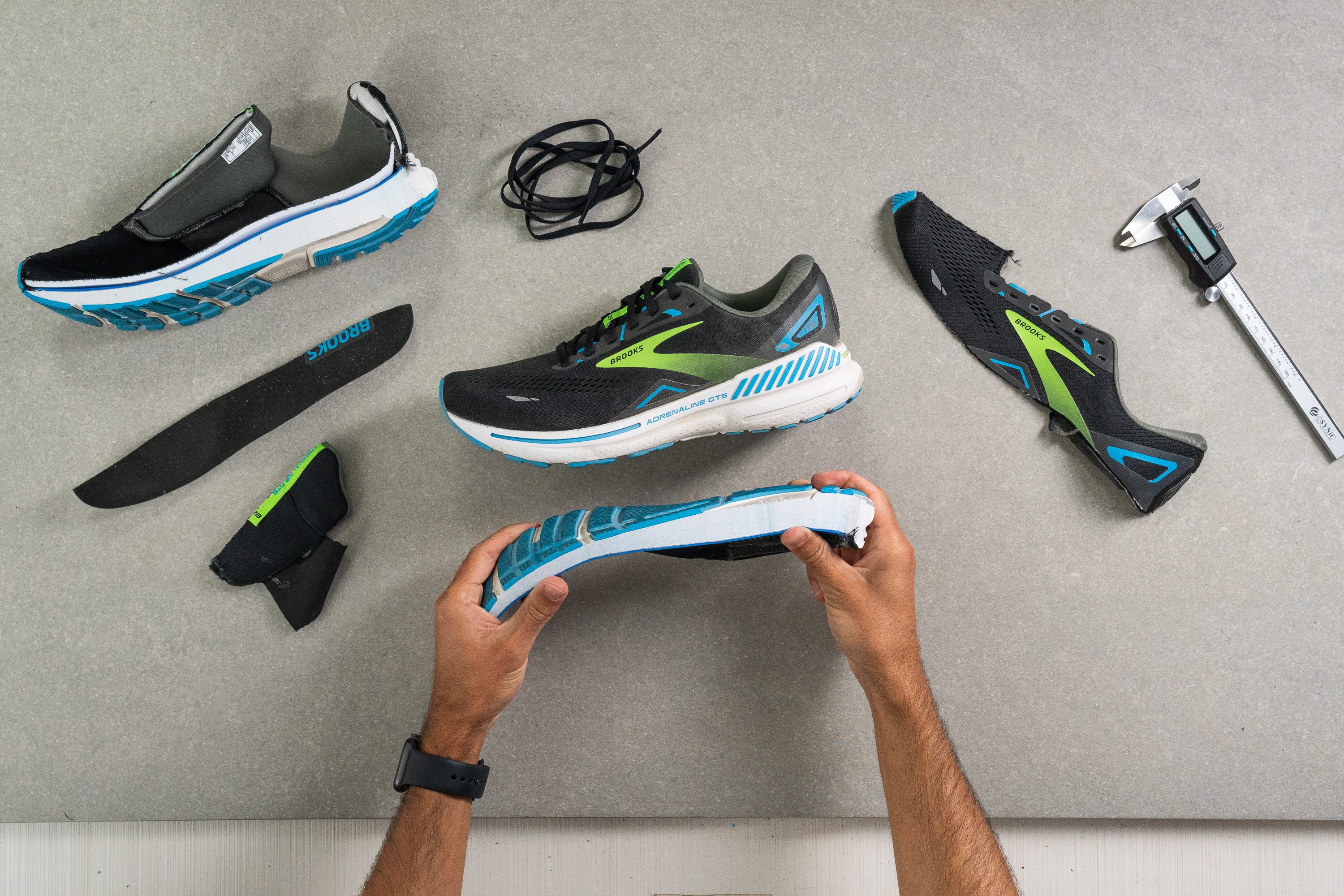
Cushioning
Shock absorption
We found moderate shock absorption in the heel with 122 SA, and a lower 86 SA in the forefoot. This kind of result is common in daily trainers with a high heel-to-toe drop, making the shoe likely a better fit for heel strikers.
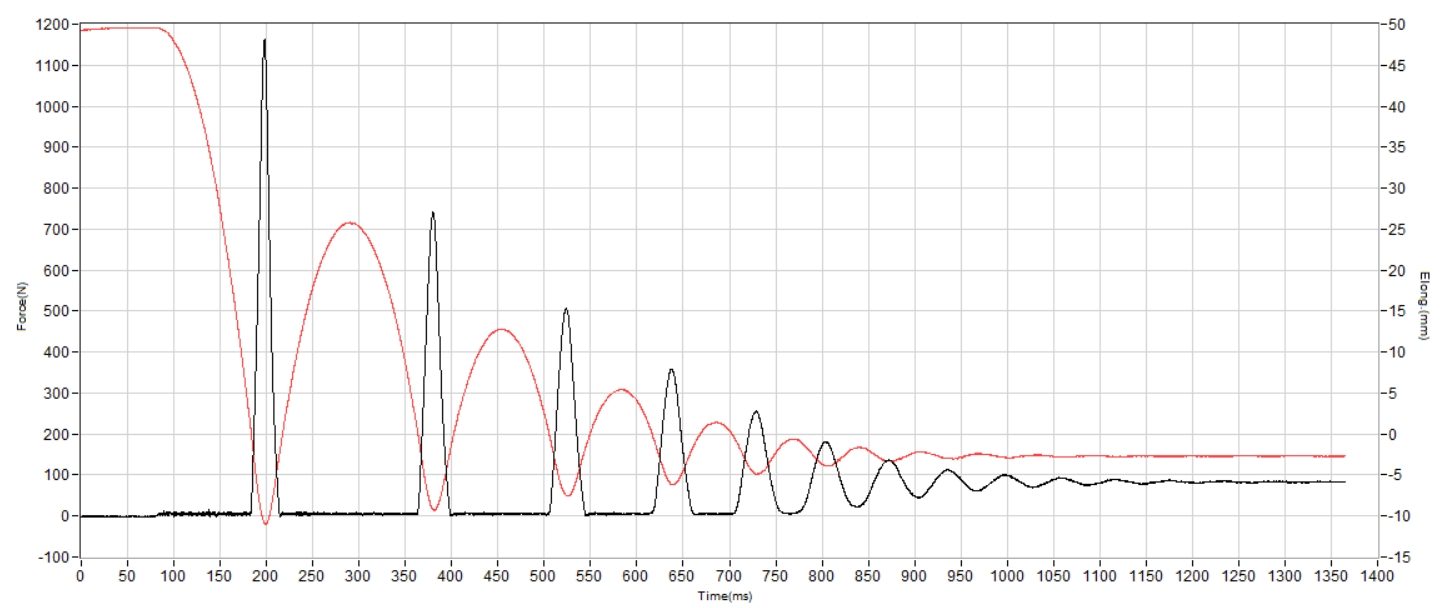
| Adrenaline GTS 23 | 122 SA |
| Average | 130 SA |
Energy return
Energy return is nothing exceptional, but we expected an average result considering the EVA-based midsole. So the 53.9% score lands in the lower tier—something that could be improved, though it didn’t come as a surprise after our runs.
| Adrenaline GTS 23 | 53.9% |
| Average | 58.6% |
Heel stack
As a stable shoe designed for heel strikers, we anticipated a generous heel stack in the Adrenaline GTS 23. We measured it at 34.1 mm, which provides more than enough cushioning for any runner.
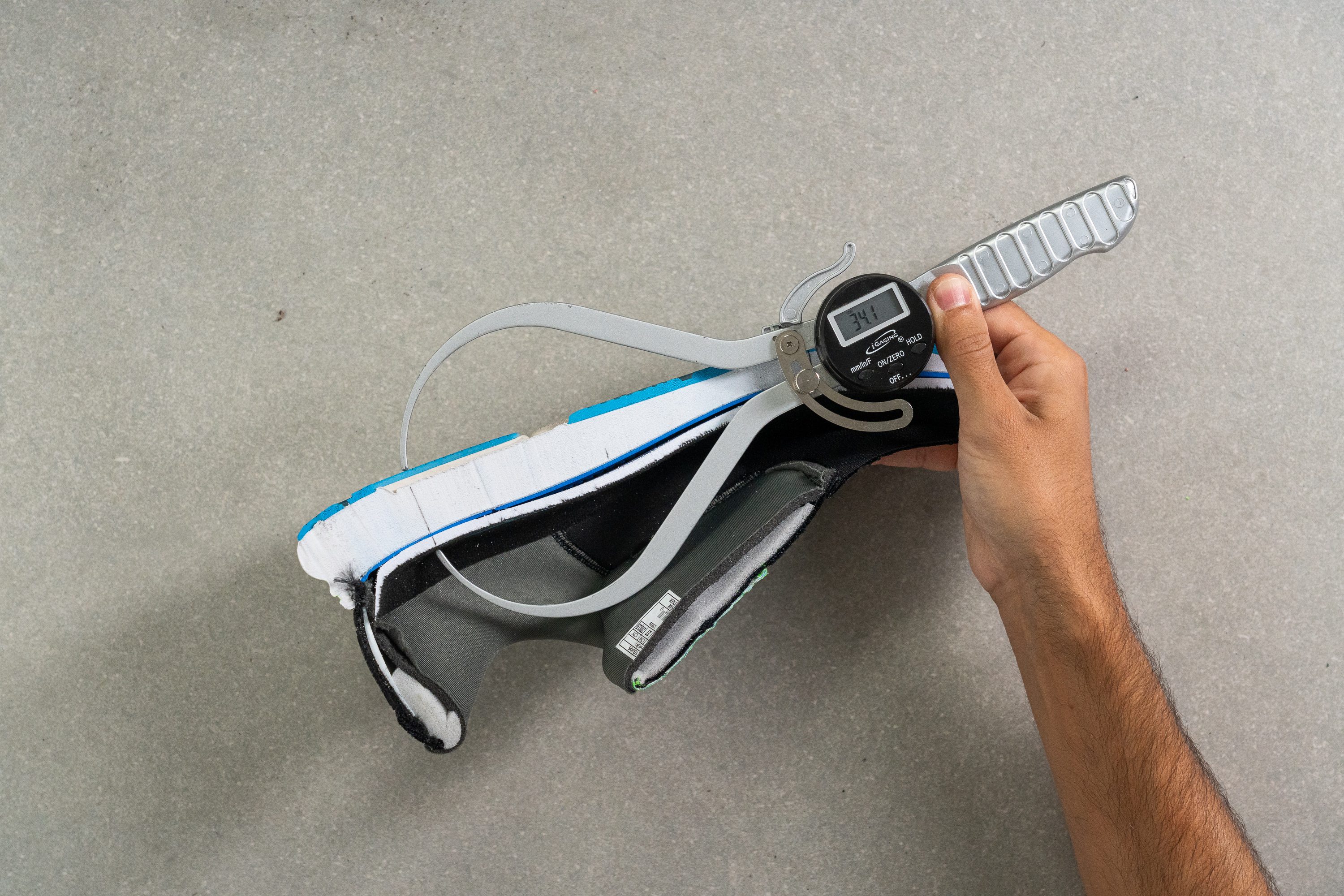
| Adrenaline GTS 23 | 34.1 mm |
| Average | 34.8 mm |
Forefoot stack
In the forefoot, the shoe seems too thin for our liking, measuring at only 21.5 mm and that includes the insole and the outsole. We would have preferred a bit more foam.
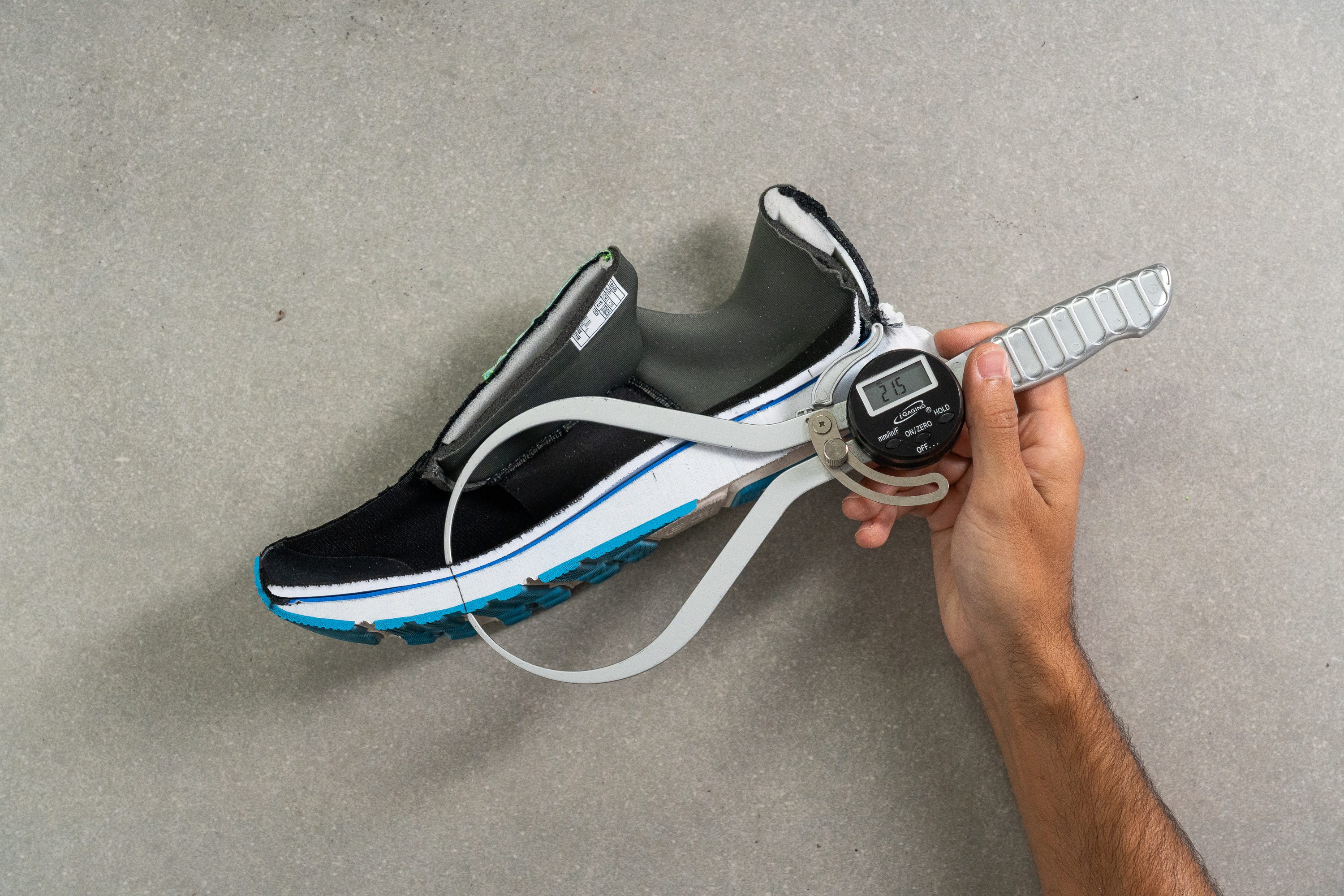
| Adrenaline GTS 23 | 21.5 mm |
| Average | 26.2 mm |
Drop
The difference between the heel and the forefoot results in a 12.6-mm heel-to-toe drop, which is pretty close to the measurement stated by Brooks (12 mm).
This design feature makes the shoe particularly well-suited for heel strikers, which is exactly what we expected from a stability daily trainer.
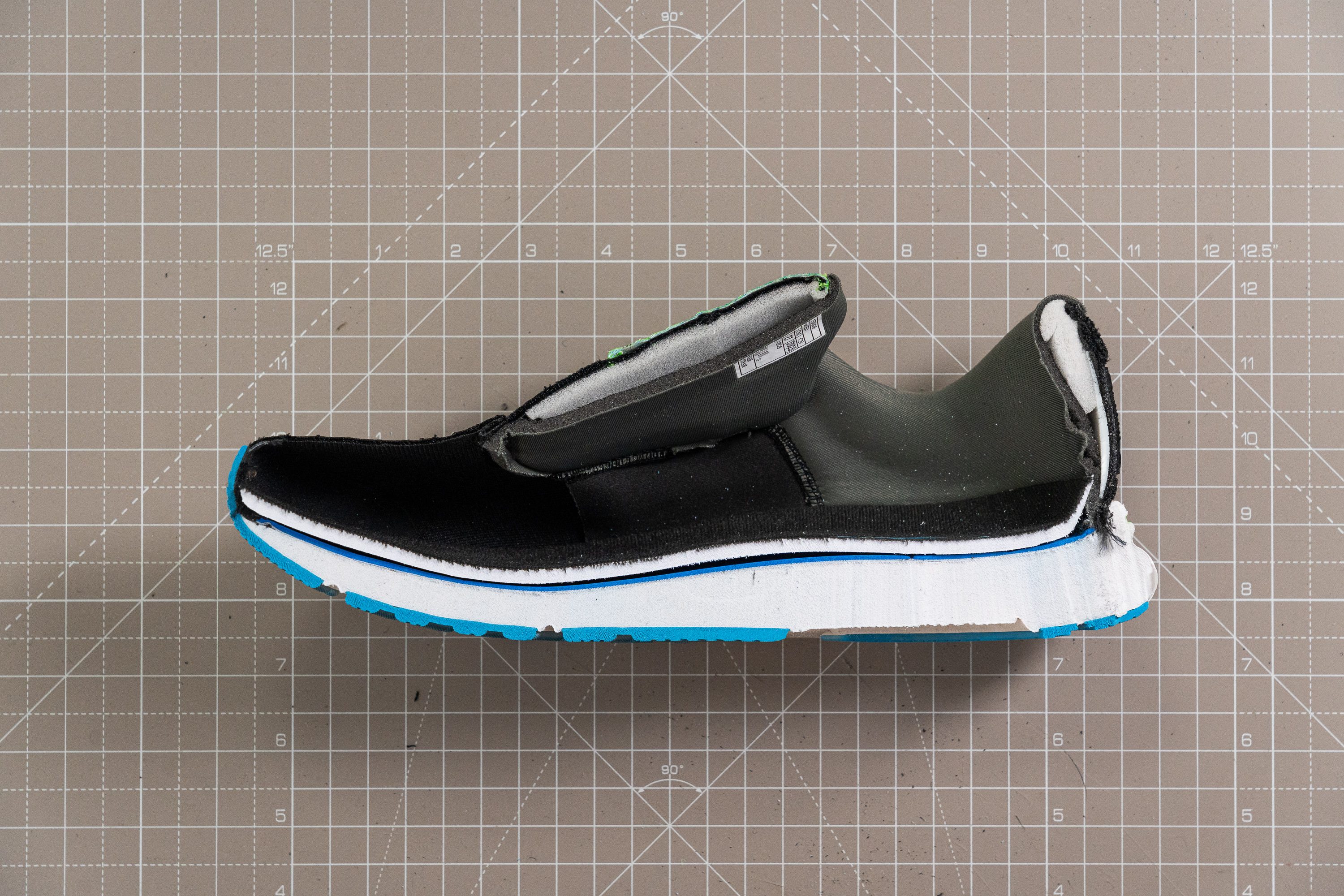
| Adrenaline GTS 23 | 12.6 mm |
| Average | 8.6 mm |
Midsole softness
The midsole of the shoe is made entirely from DNA Loft v2, the same compound that Brooks uses in the popular Ghost 15.
This is a reliable midsole, providing a good balance between softness and stability. When we measured it, the result was 19.5 HA, a figure that really highlights its well-balanced approach.
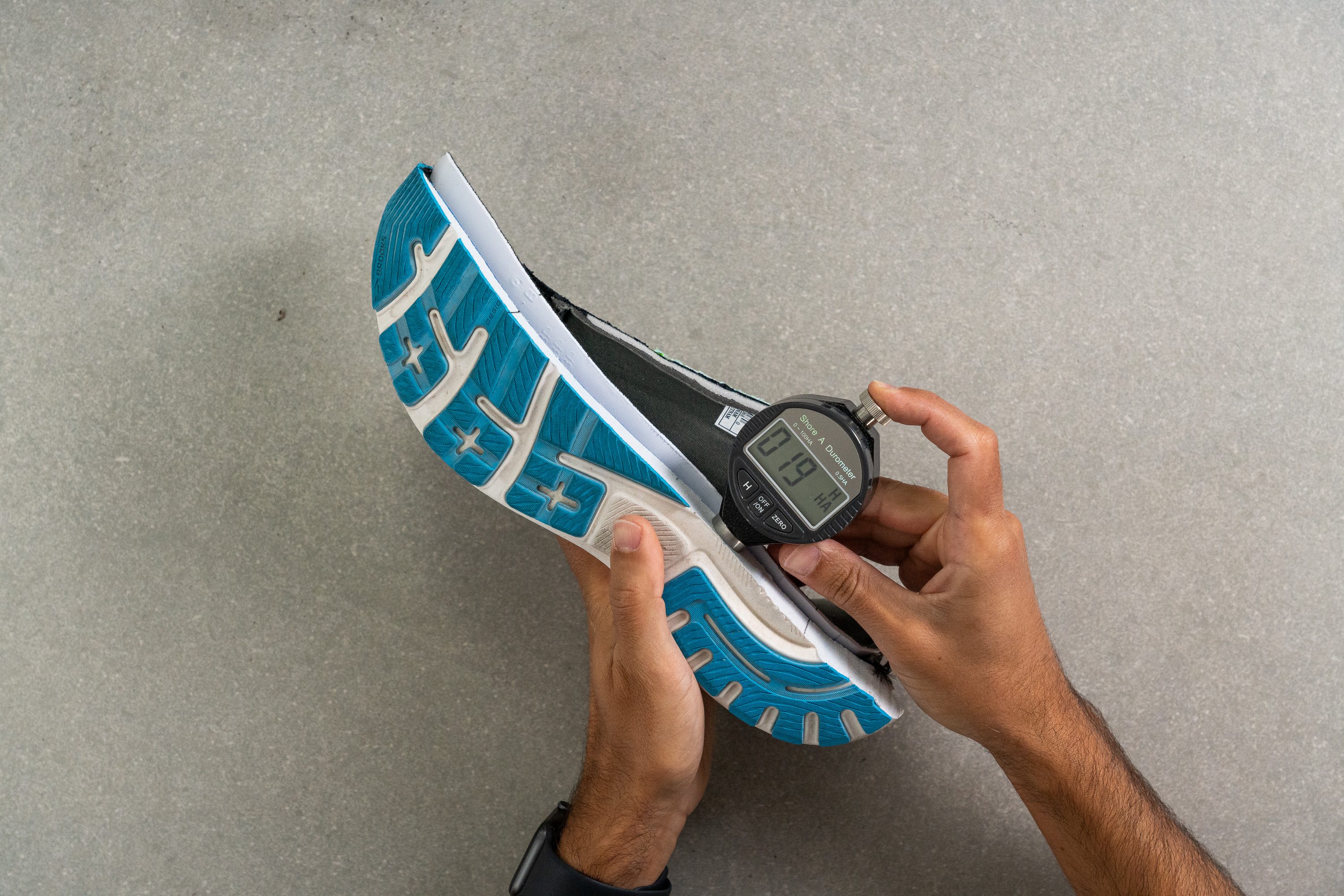
| Adrenaline GTS 23 | 19.5 HA |
| Average | 20.4 HA |
Size and fit
Size
Brooks Adrenaline GTS 23 fits true to size (1949 votes).
Internal length
According to Brooks' sizing charts, a US size 9 should equate to 270 mm. In our measurements, we found it to be 271.5 mm, which is slightly longer than usual but not enough to recommend a size-up. For us, it's a true-to-size fit.
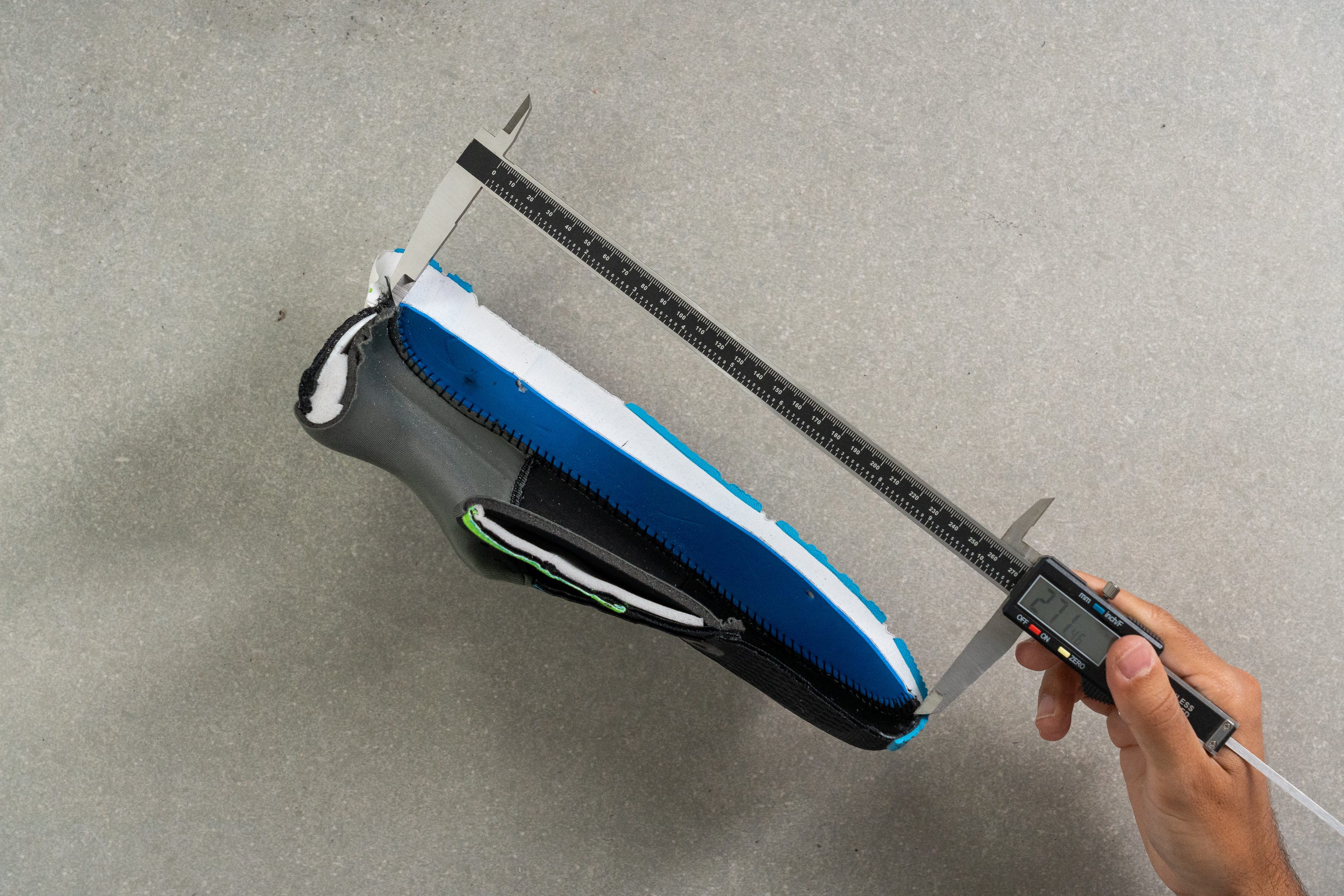
| Adrenaline GTS 23 | 271.5 mm |
| Average | 269.4 mm |
Toebox width - widest part
If you have wide feet, you might find the upper in the Adrenaline GTS 23 to fit a bit like a performance shoe. However, we measured it at 99.9 mm, which is pretty standard and in line with most daily trainers.
But there's no need to worry, as Brooks offers multiple widths, ranging from narrow to extra wide. They are one of the few brands that provide such variety.
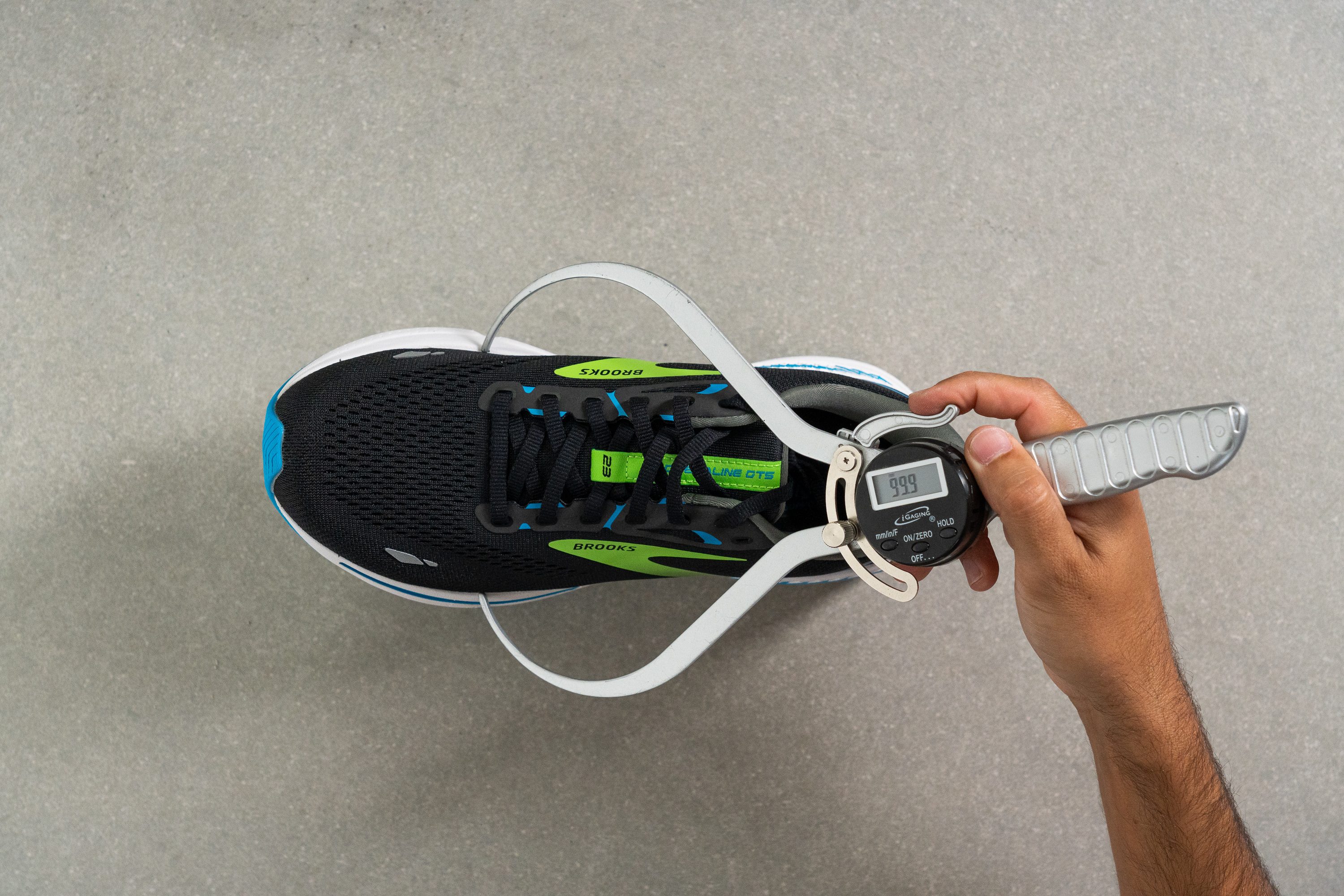
This test follows an older methodology, which is why you don't see recently tested shoes in the chart. Results from different methodologies can not be compared.
| Adrenaline GTS 23 | 99.9 mm |
| Average | 98.5 mm |
Toebox width - big toe
In the area surrounding the toes, we measured 78.7 mm, and this measurement matches what we felt. It's neither wide nor narrow, just average.
But as we said just before, if you need a different fit, feel free to choose between the multiple widths available.
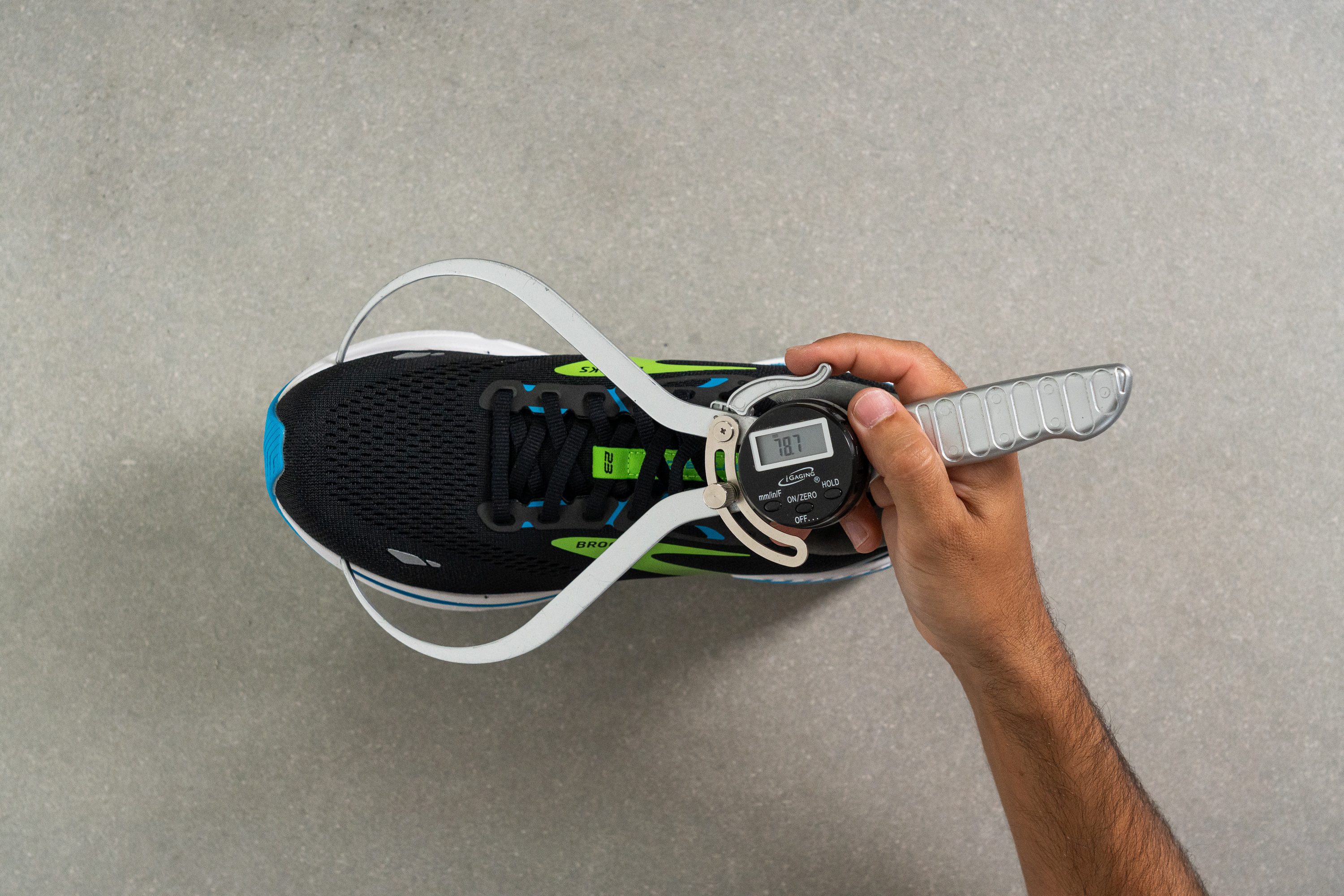
This test follows an older methodology, which is why you don't see recently tested shoes in the chart. Results from different methodologies can not be compared.
| Adrenaline GTS 23 | 78.7 mm |
| Average | 78.4 mm |
Traction / Grip
Traction test
Taking sharp turns will not be a problem in this Brooks shoe, even on a rainy day.
Following the SATRA TM144 grip test method, we recorded the shoe's forefoot friction score at 0.47 in wet conditions. This is a solid measurement for a road running shoe that gives enough bite to keep you skid-free on slick pavements.
| Adrenaline GTS 23 | 0.47 |
| Average | 0.49 |
Outsole design
The Brooks Adrenaline GTS 23 shows how an outsole can be built to last while staying flexible. It features plenty of cutouts in the forefoot, yet the rubber coverage is among the best in its category, so we don’t expect problems even for runners who wear down rubber in odd spots.
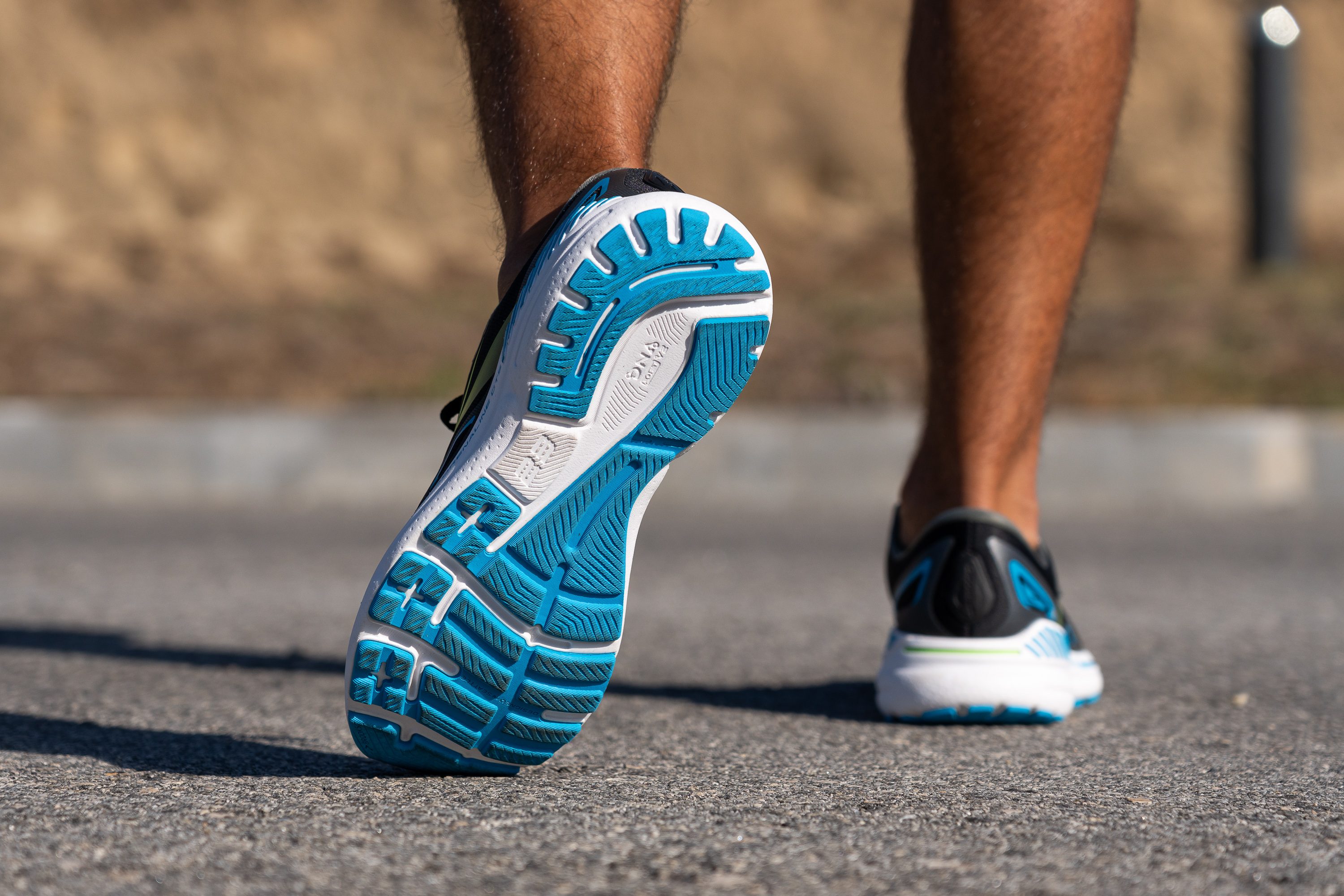
Flexibility / Stiffness
In the pursuit of creating a shoe that's stable yet comfortable, achieving torsional stiffness is crucial, as demonstrated by the GTS 23 before. However, the shoe also needs a low score regarding longitudinal flexibility.
In our test, we find that we only need to use 10.4N of force to bend it to the 30-degree measurement point. This is exactly the result we were looking for.
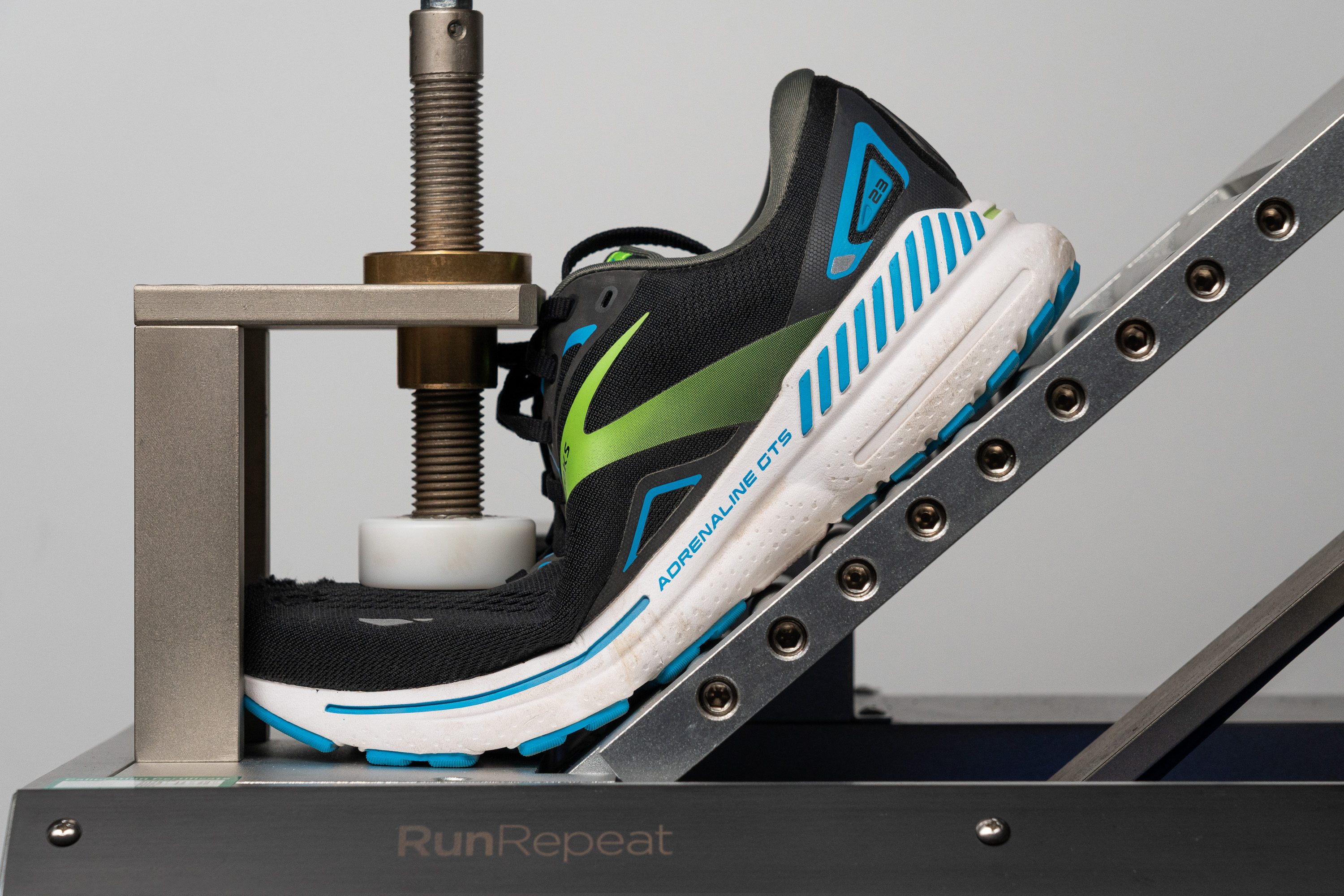
| Adrenaline GTS 23 | 10.4N |
| Average | 15.3N |
Stiffness in cold (%)
After leaving the Adrenaline GTS 23 in our freezer for 20 minutes to simulate cold temperatures, we discovered that the shoe got a little stiffer. It now requires 22.5N of force to bend to the same point. However, it almost feels the same as before.
In fact, we're looking at a 27% change, which is better than almost every other shoe on the market. This result is especially surprising for a foam based on EVA. Brooks has really done well with this formulation.
| Adrenaline GTS 23 | 27% |
| Average | 33% |
Weight
On the scale, the Adrenaline GTS 23 weighs in at 10.10 oz (286g). This is slightly above average, but we see it as a good result for a stability shoe.
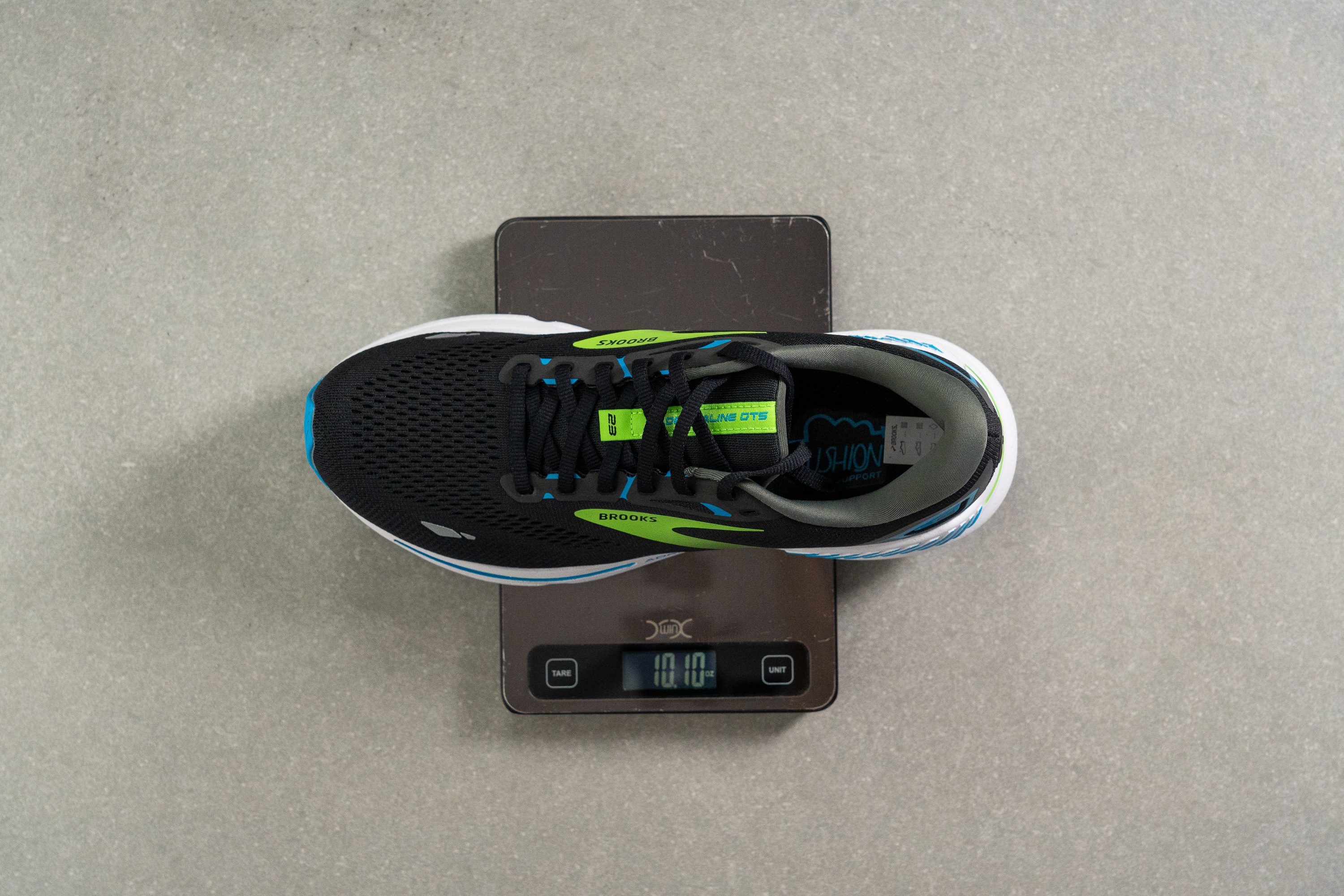
| Adrenaline GTS 23 | 10.1 oz (286g) |
| Average | 9.3 oz (264g) |
Breathability
Breathability is one of the essential features for any daily trainer aiming to win over the market. It's vital for ensuring a comfortable run when the weather turns warm.
The Brooks Adrenaline GTS 23 truly shines in this aspect, displaying one of the most impressive performances we've ever witnessed in the lab regarding breathability.
Naturally, we awarded it a perfect score of 5/5. Watching the smoke escape through the enormous ventilation holes in the upper is simply mesmerising!
After achieving the perfect score with the smoke-pumping machine, we took a closer look to understand why it succeeded. Under the light, it's incredibly easy to spot the large ventilation holes and understand why this 3D Fit Print upper breathes so well.
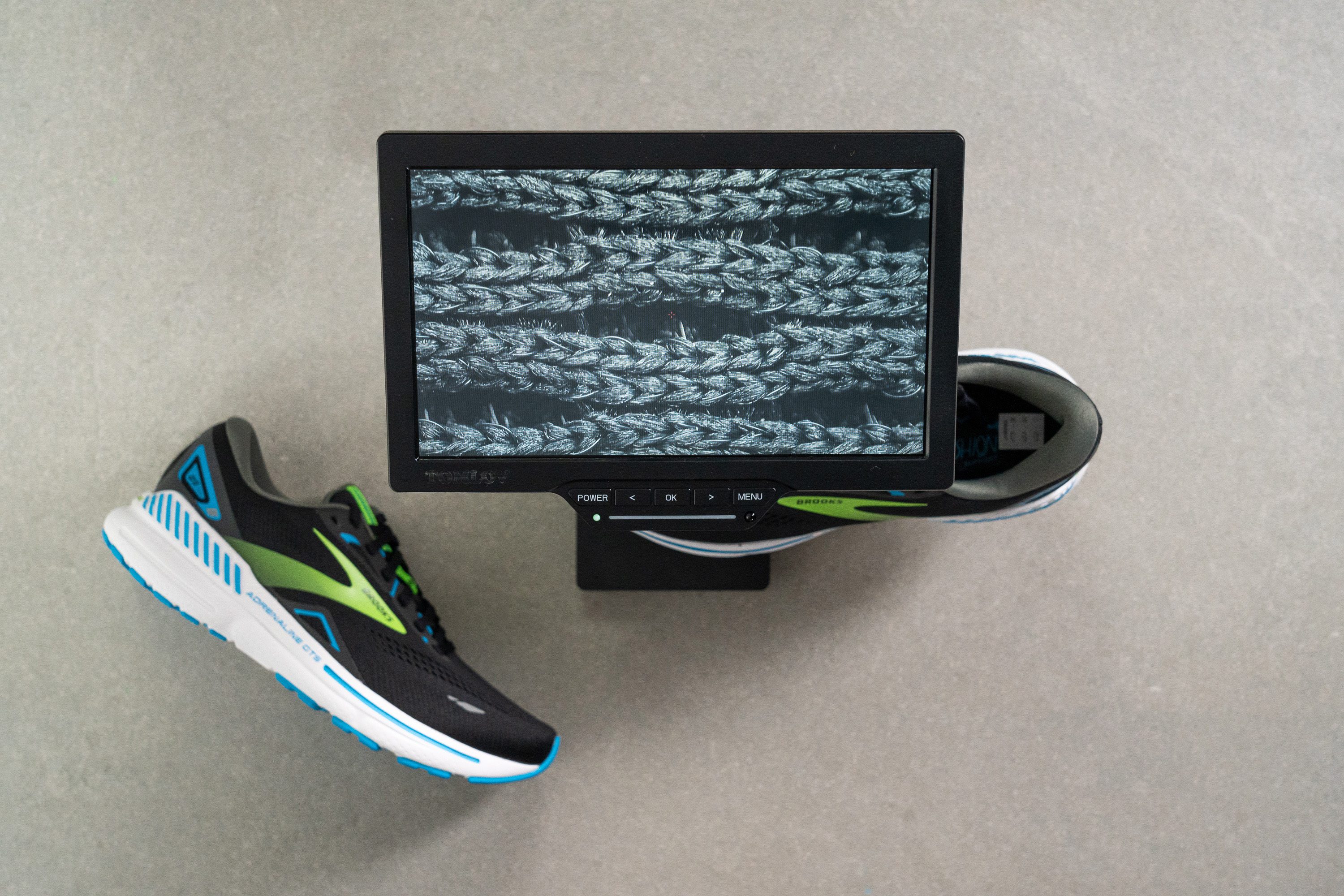
When we examined the shoe under the microscope, we found an interior fabric layer, but its remarkable thinness ensures that it doesn't affect airflow at all.
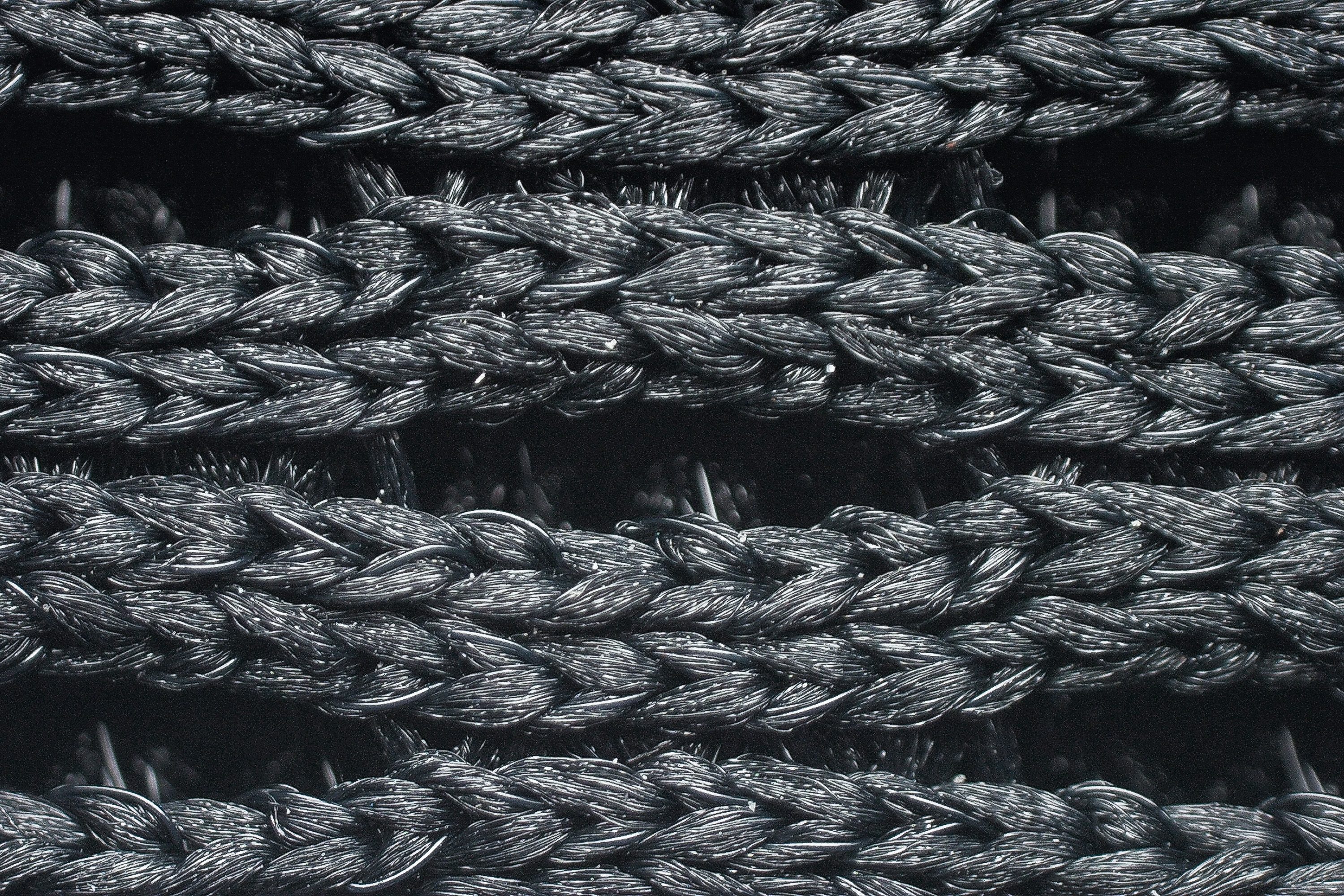
It's important to highlight this feature, as it's a common mistake made by many running shoe manufacturers. They create large ventilation holes but then pair them with an interior layer that's too thick, effectively destroying breathability.
| Adrenaline GTS 23 | 5 |
| Average | 3.7 |
Stability
Lateral stability test
As "GTS" comes from "Go To Support", Brooks is already signalling to us that this is a shoe oriented towards that goal. But we don't really know this until we test it. Fortunately, we can confirm that this is indeed a very stable shoe.
It will suit 9 out of 10 runners looking for more stability. However, those who have extreme levels of pronation will be better off with a firmer and stiffer shoe like the Hoka Gaviota 4.
Torsional rigidity
We rated the torsional rigidity of the GTS 23 at 4 out of 5, and that's enough to deliver a stable ride.
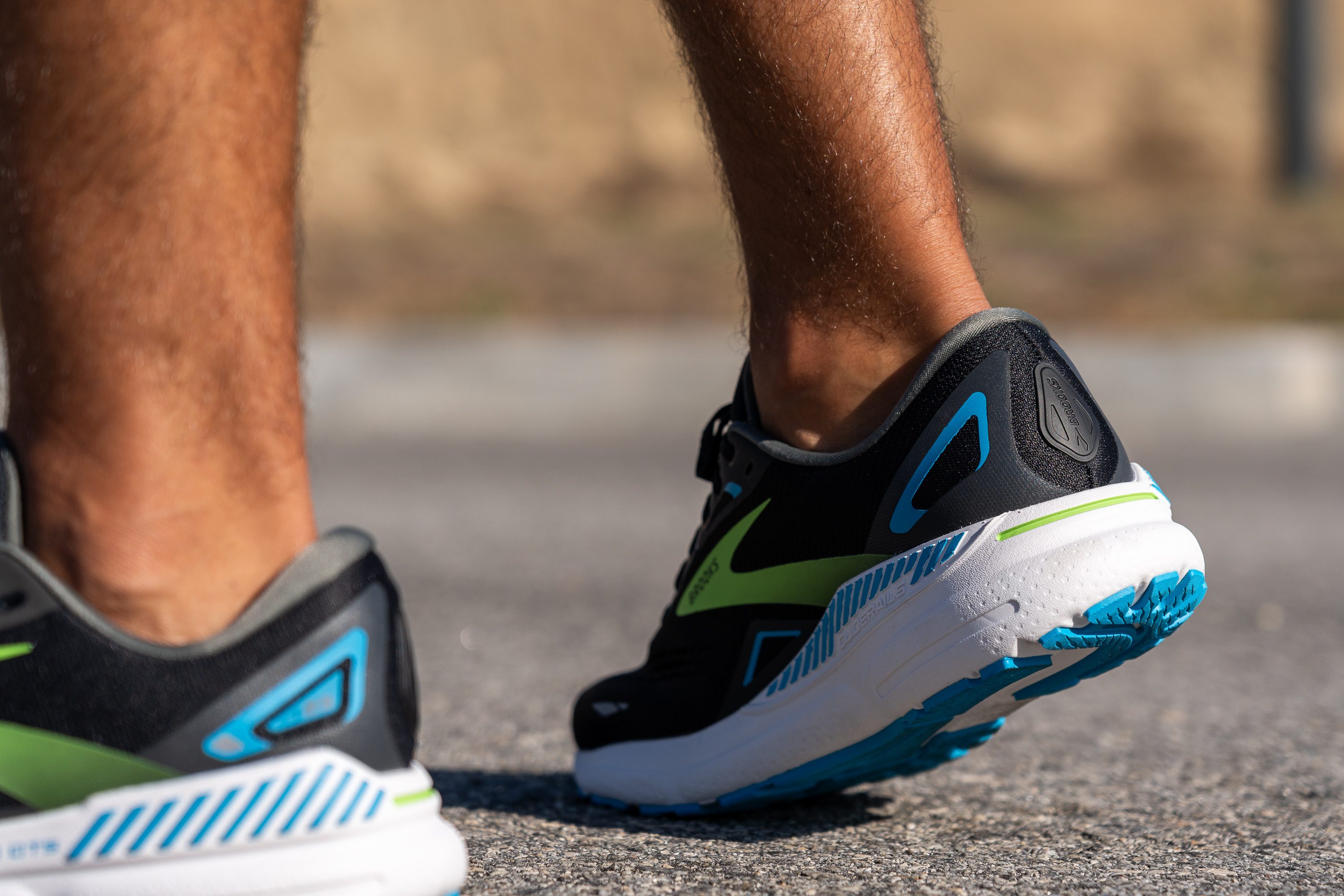
Most of this rigidity comes from Brooks' GuideRails technology, a common feature in their stability shoes. These plastic pieces are smartly integrated into both sides of the shoe surrounding the heel, providing support by keeping excess movements in check.
| Adrenaline GTS 23 | 4 |
| Average | 3.5 |
Heel counter stiffness
According to what the textbook says, a stability shoe must have a stiff heel counter. Here again, Brooks didn't want to go overboard with it but maintained a bit of comfort, so we rated it at 4 out of 5.
| Adrenaline GTS 23 | 4 |
| Average | 2.9 |
Midsole width - forefoot
Let's keep the textbook open—if you want a stable stride, you need to have a wide landing base. Obviously, the wider the shoe, the more stable the ride, right?
That's why Brooks made this shoe wider than most others in the forefoot. We measured it in the lab at 117.3 mm. For instance, a Nike Pegasus 40 measures only 111.3 mm.
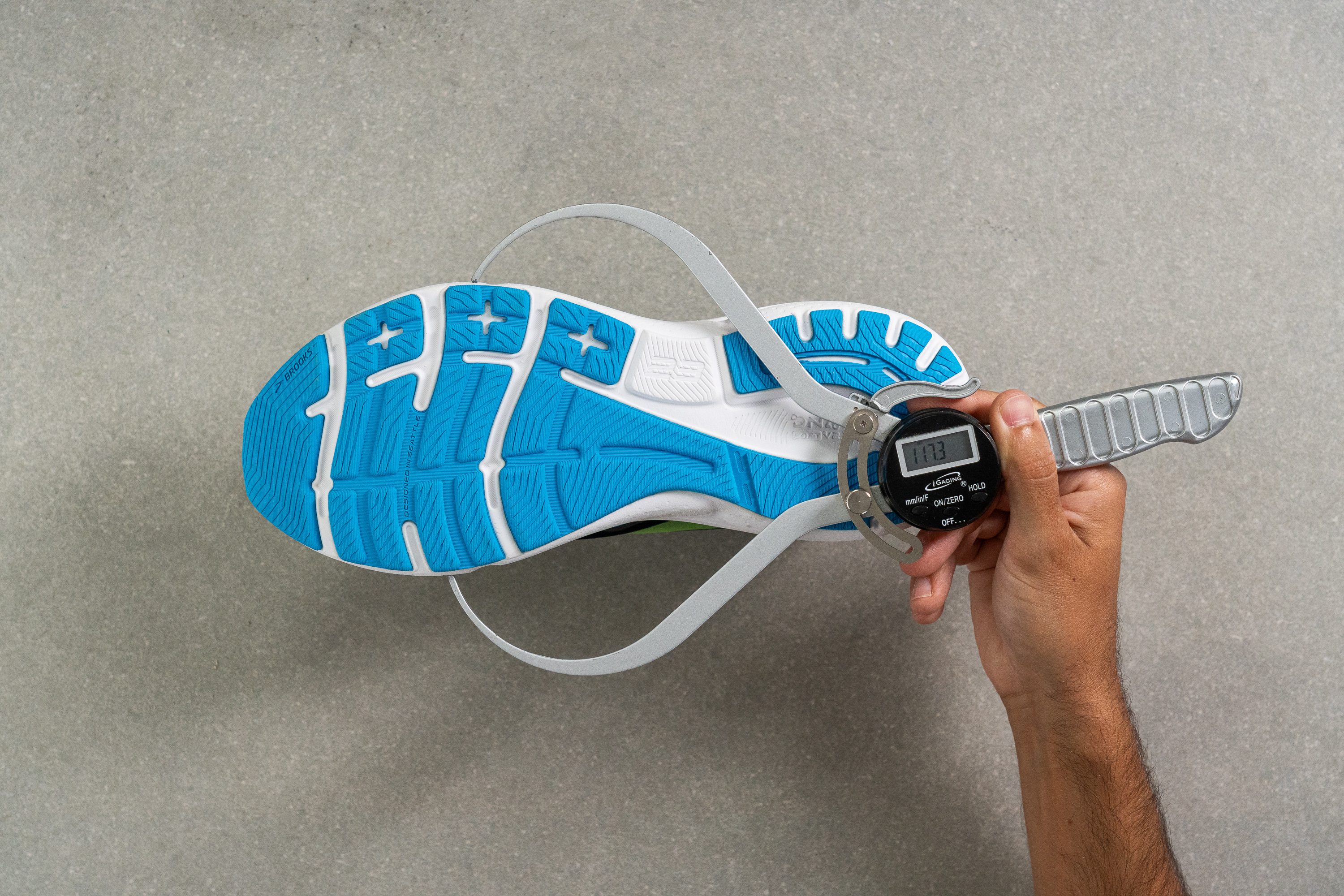
| Adrenaline GTS 23 | 117.3 mm |
| Average | 114.4 mm |
Midsole width - heel
The heel of the GTS 23 follows the same approach, being wider than most neutral shoes. Measuring 96.9 mm, it provides a safe landing platform for heel strikers.
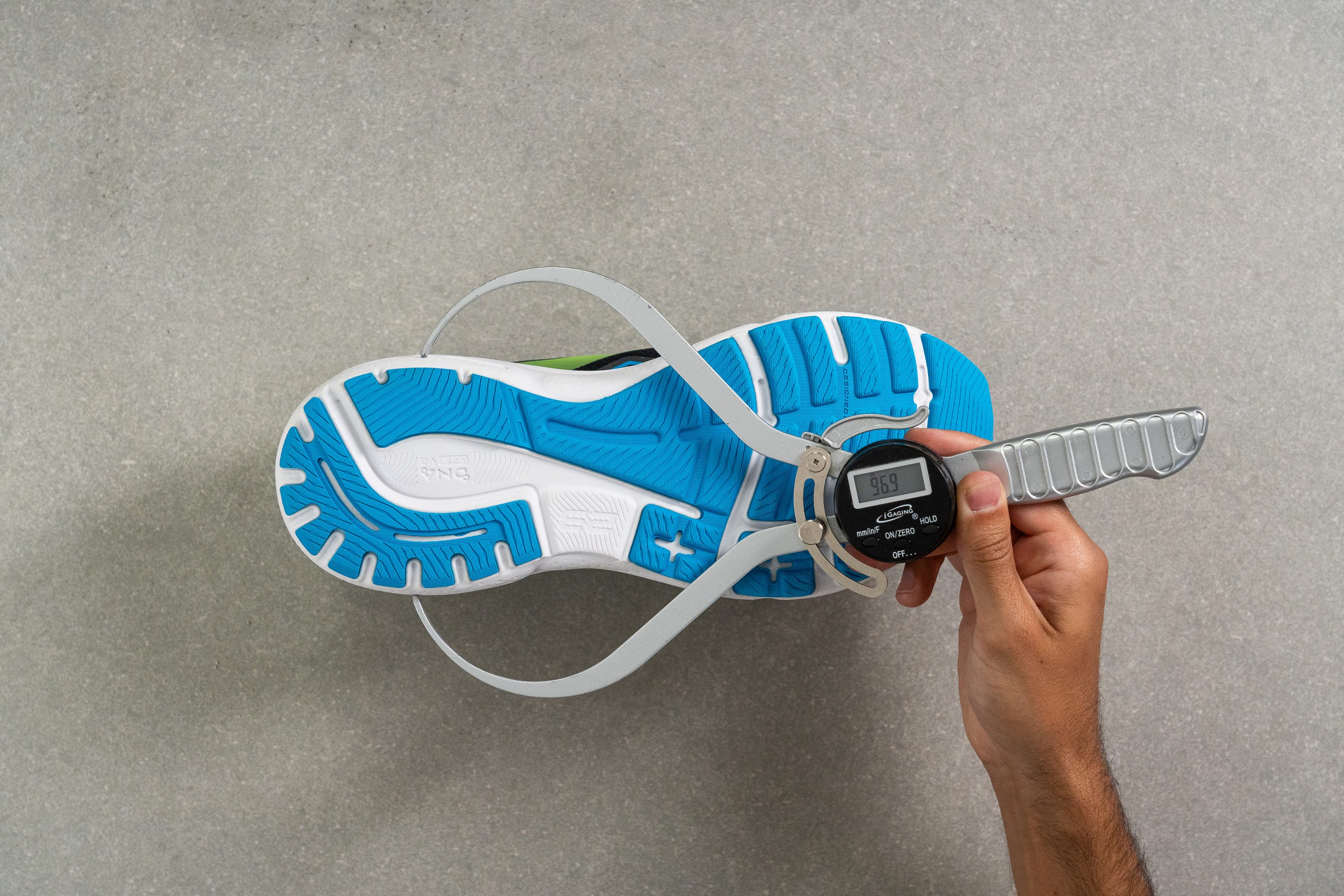
| Adrenaline GTS 23 | 96.9 mm |
| Average | 90.6 mm |
Durability
Toebox durability
However, the thin engineered mesh of the Adrenaline GTS 23 leaves a lot to be desired when it comes to durability.
We put it through our standardised Dremel test, where we apply consistent force and time to each shoe, and this one ended up at the bottom of the pile with a 1/5 score.
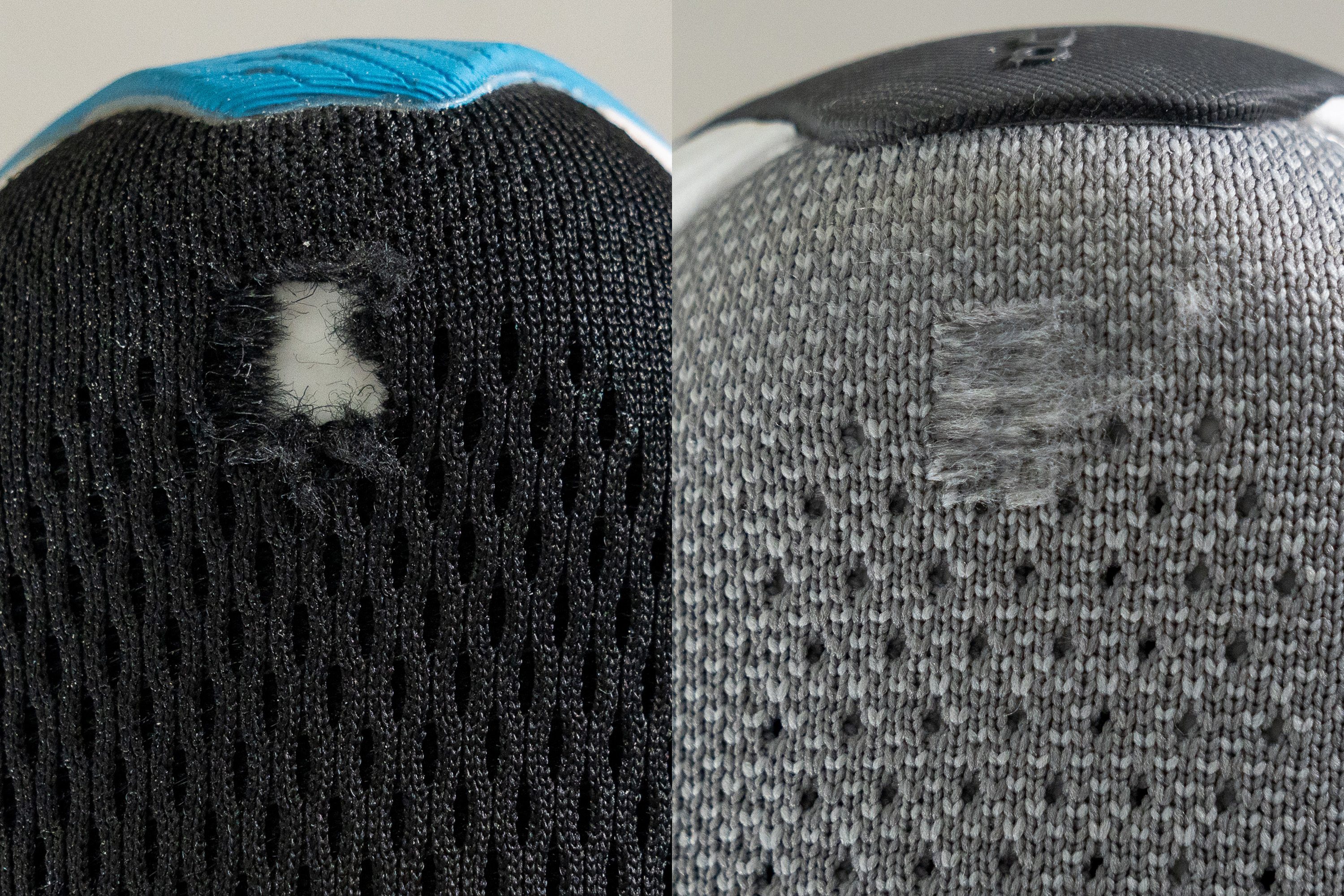
| Adrenaline GTS 23 | 1 |
| Average | 2.6 |
Heel padding durability
Brooks pulled off a wonderful surprise with the heel. It's crafted from a durable-yet-comfy material, which really shines in this test.
The heel completely turned things around, scoring an impressive and well-deserved 5/5!
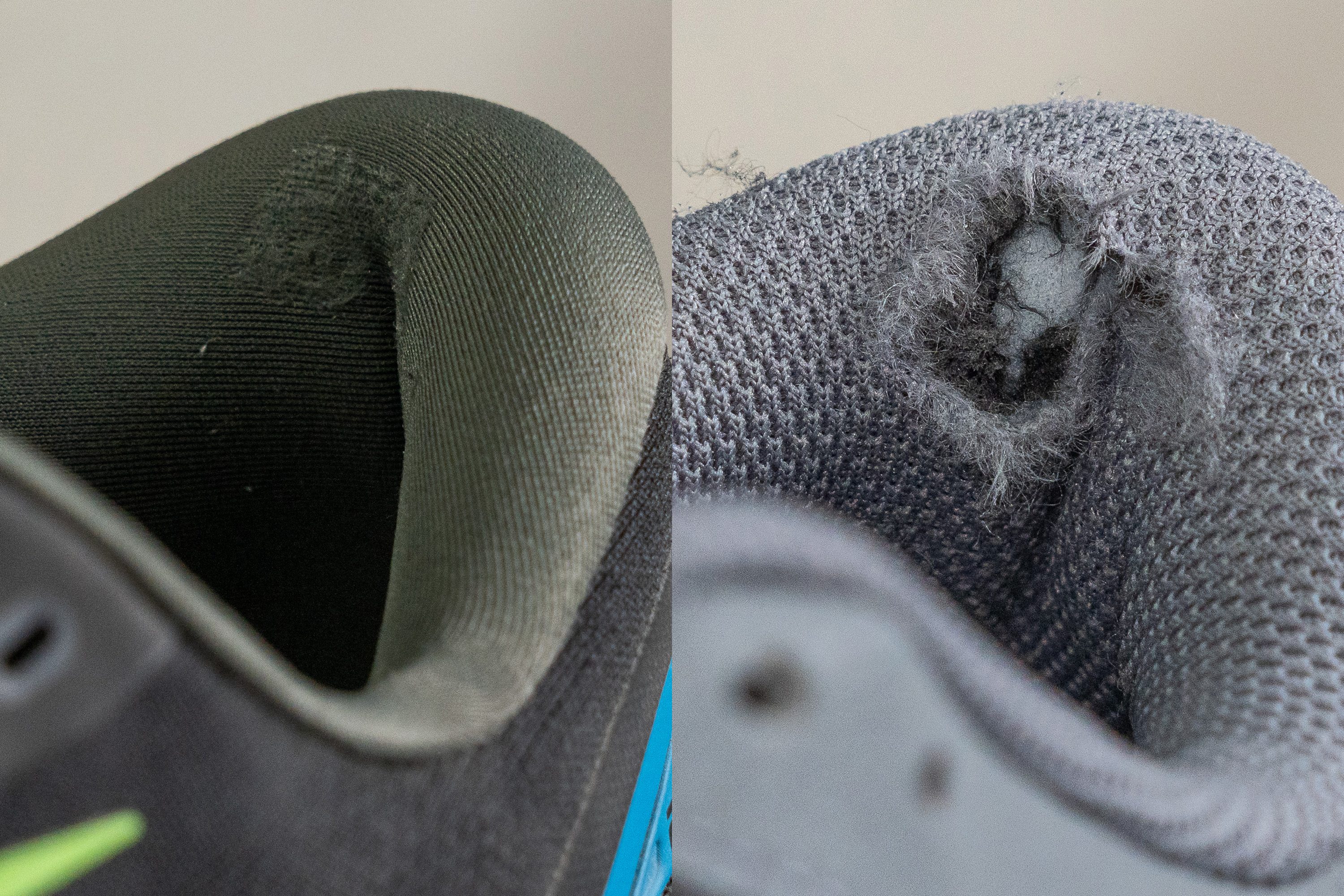
| Adrenaline GTS 23 | 5 |
| Average | 3.4 |
Outsole hardness
Switching our attention to the outsole, the American brand takes a no-risk approach. Our measurements revealed a hardness of 80.5 HC, providing a nice grip without any issues of wear and tear.
This is exactly the kind of performance and durability we look for in a daily trainer.
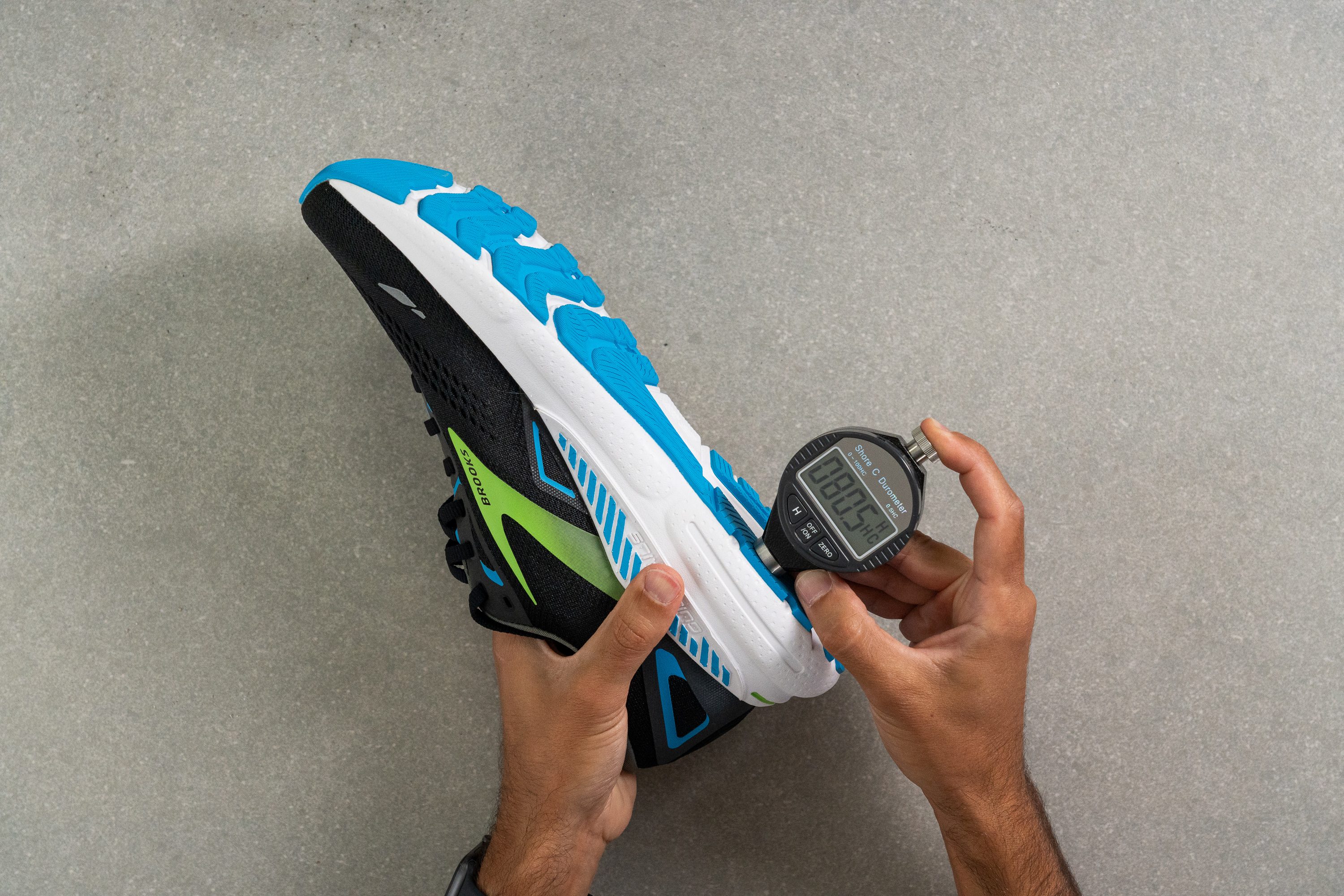
| Adrenaline GTS 23 | 80.5 HC |
| Average | 79.2 HC |
Outsole durability
We utilised the Dremel for one final test, and the outsole of the Adrenaline GTS 23 performed well.
Once the test was complete, we measured 0.67-mm indentation in the rubber—an okay outcome. On average, we get a deeper dent in running shoes.
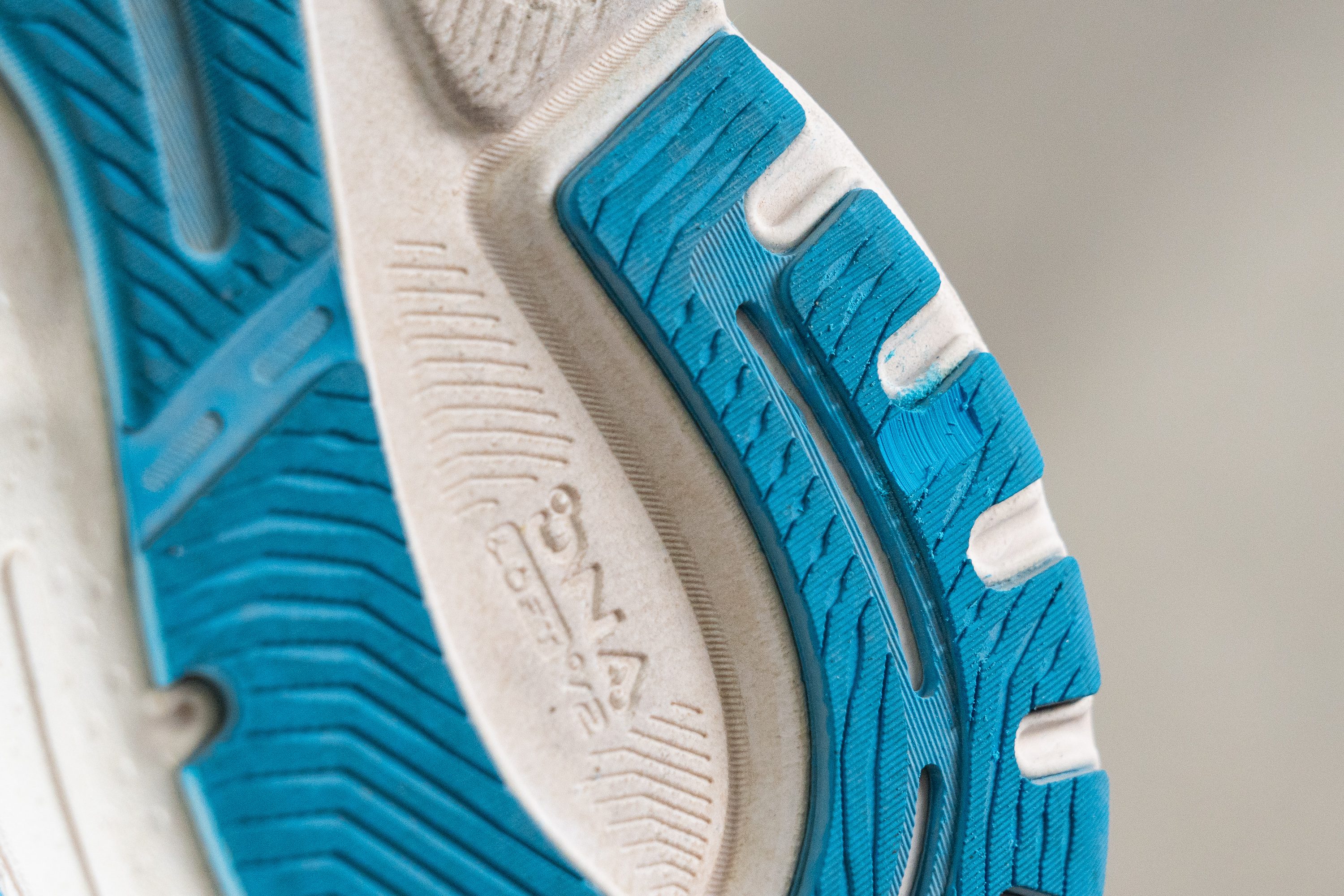
| Adrenaline GTS 23 | 0.7 mm |
| Average | 1.1 mm |
Outsole thickness
But there's still a vital part missing in the outsole puzzle. Fortunately, we've measured its thickness at 3.6 mm—more than enough to back up our well-founded claims of strong durability.
Yet it's not so much as to result in a significant weight increase in the shoe. It's a smart, well-balanced approach.
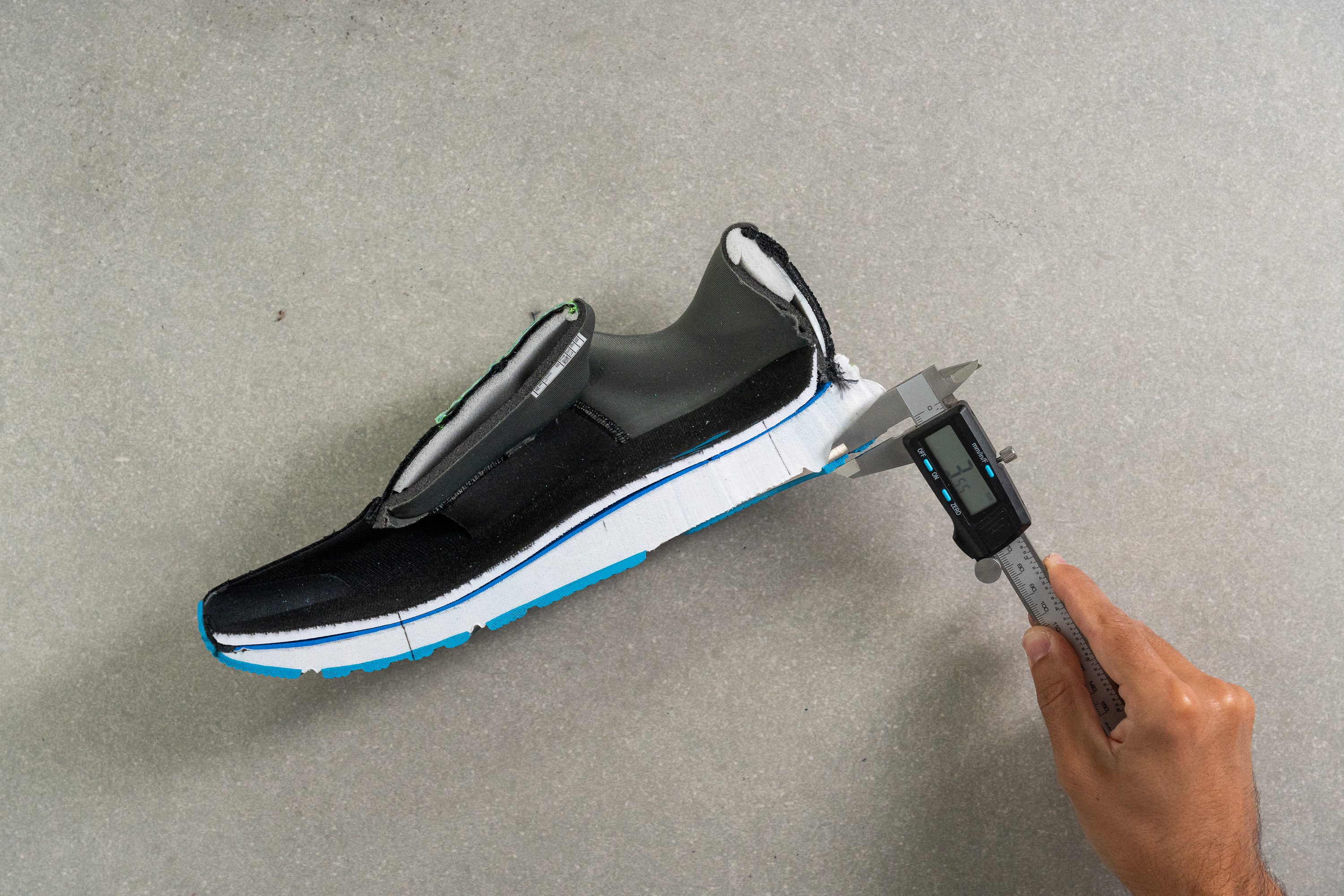
| Adrenaline GTS 23 | 3.6 mm |
| Average | 3.2 mm |
Misc
Insole thickness
Inside the shoe, we discovered a comfortable insole that has a thickness of 4.5 mm. We found nothing wrong with it, meeting our expectations for a typical insole.
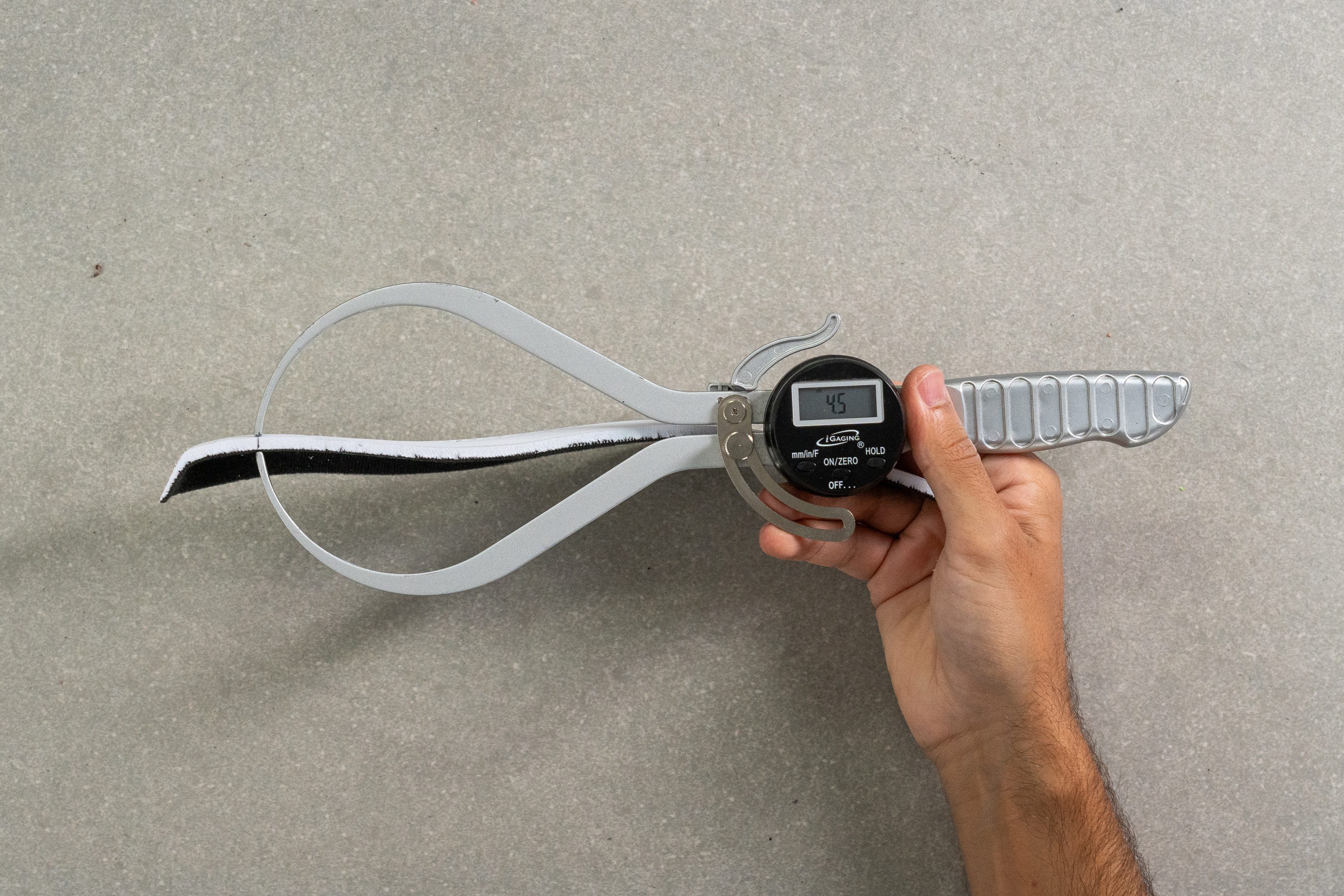
| Adrenaline GTS 23 | 4.5 mm |
| Average | 4.5 mm |
Removable insole
One great thing about this Brooks shoe is that the insole can be taken out. This means you won't run into any trouble if you want to use your own orthotics.
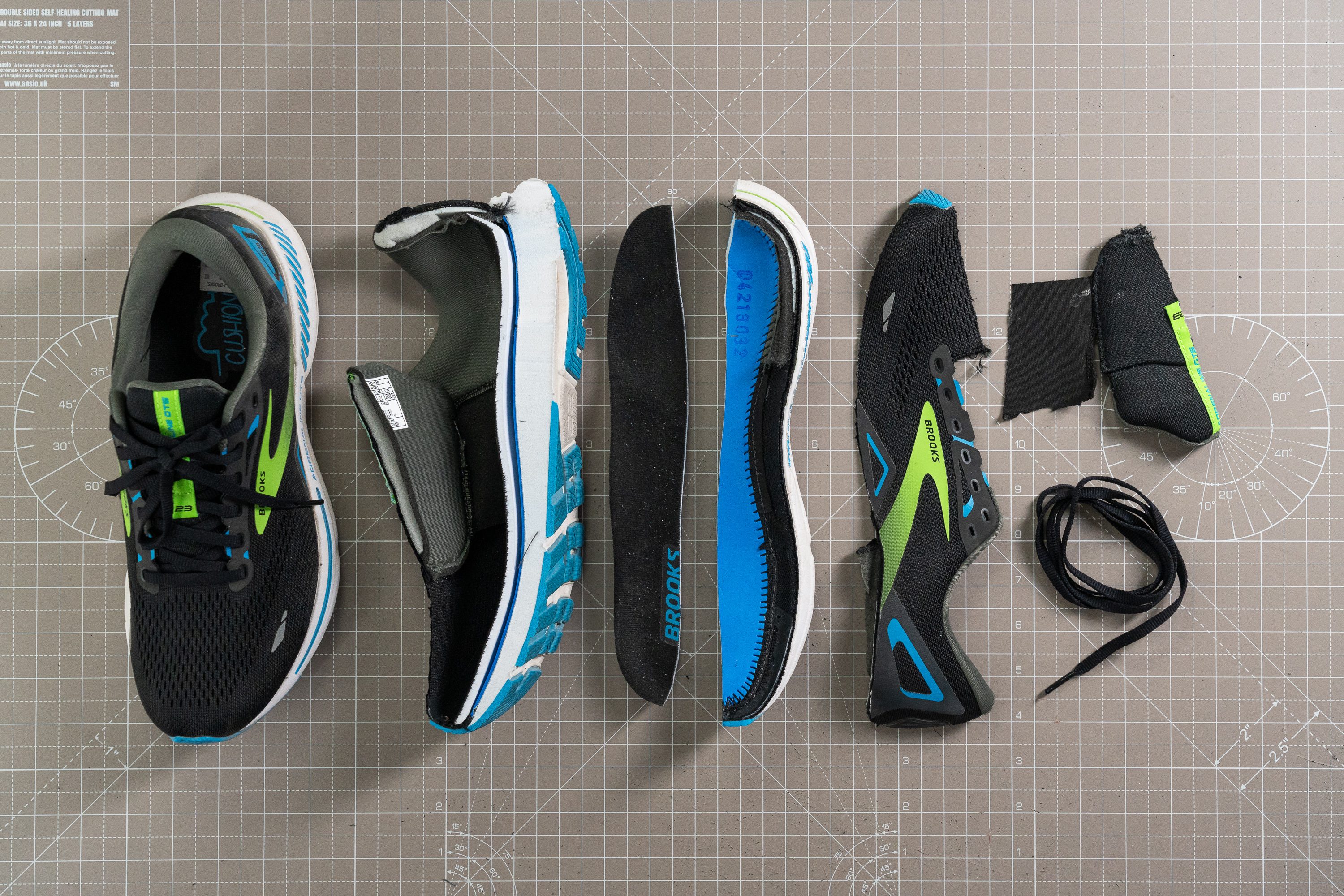
| Adrenaline GTS 23 | Yes |
Midsole softness in cold (%)
In cold temperatures, the midsole became noticeably firmer. We measured its hardness at 27.6 HA.
That's a 41.7% increase over the room temperature reading, which is a disappointing result.
Even so, we can't say we were surprised. DNA Loft v2 is an EVA foam, and this type of foam tends to become really firm in cold temperatures. We've explained this in an in-depth article on the subject.
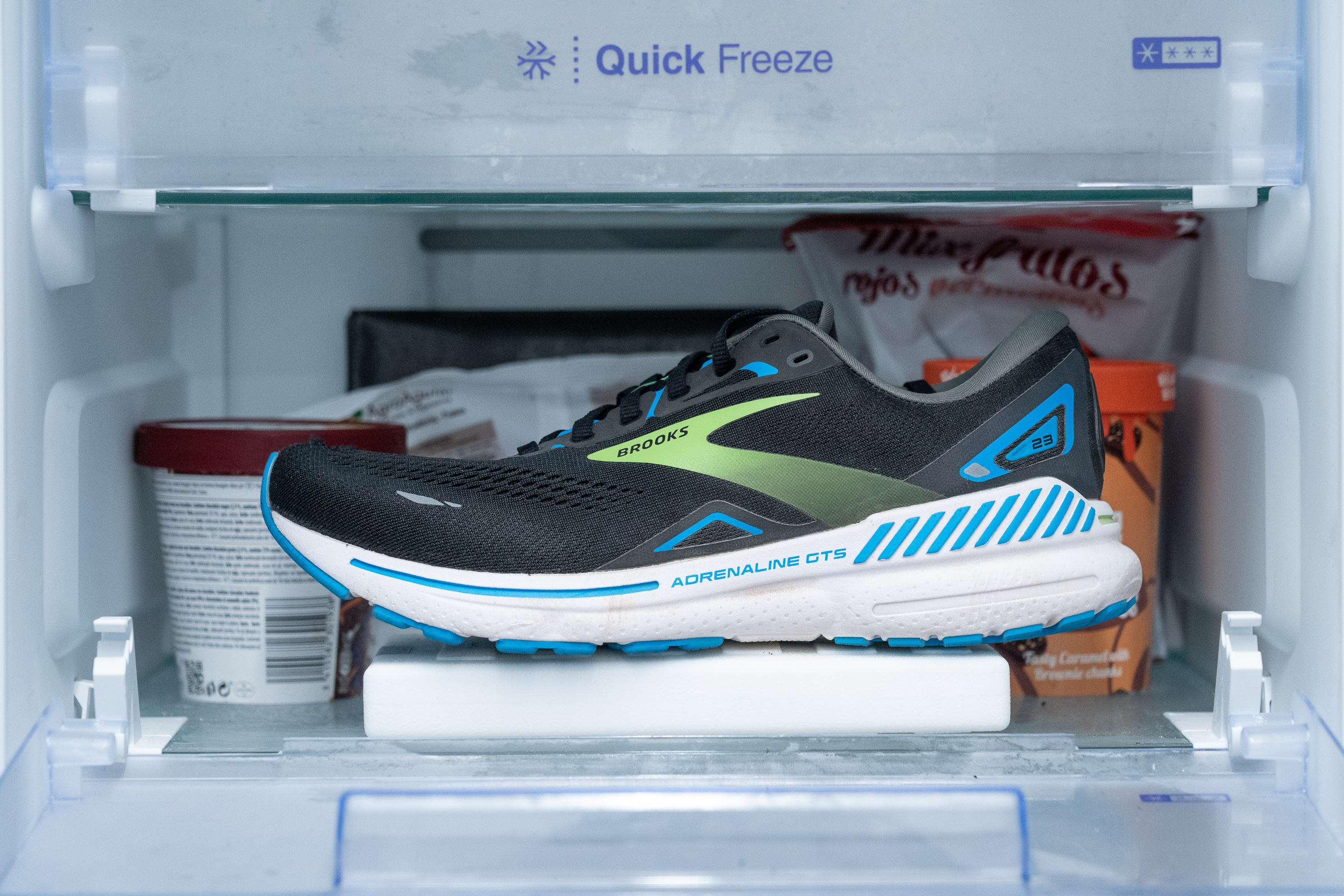
| Adrenaline GTS 23 | 42% |
| Average | 24% |
Reflective elements
Many shoes today lack reflective pieces, a feature that's unfortunately becoming less common. The GTS 23 from Brooks does include some, but we're sincerely hoping for additional reflective elements in the next version. Come on, Brooks, what about a reflective logo?
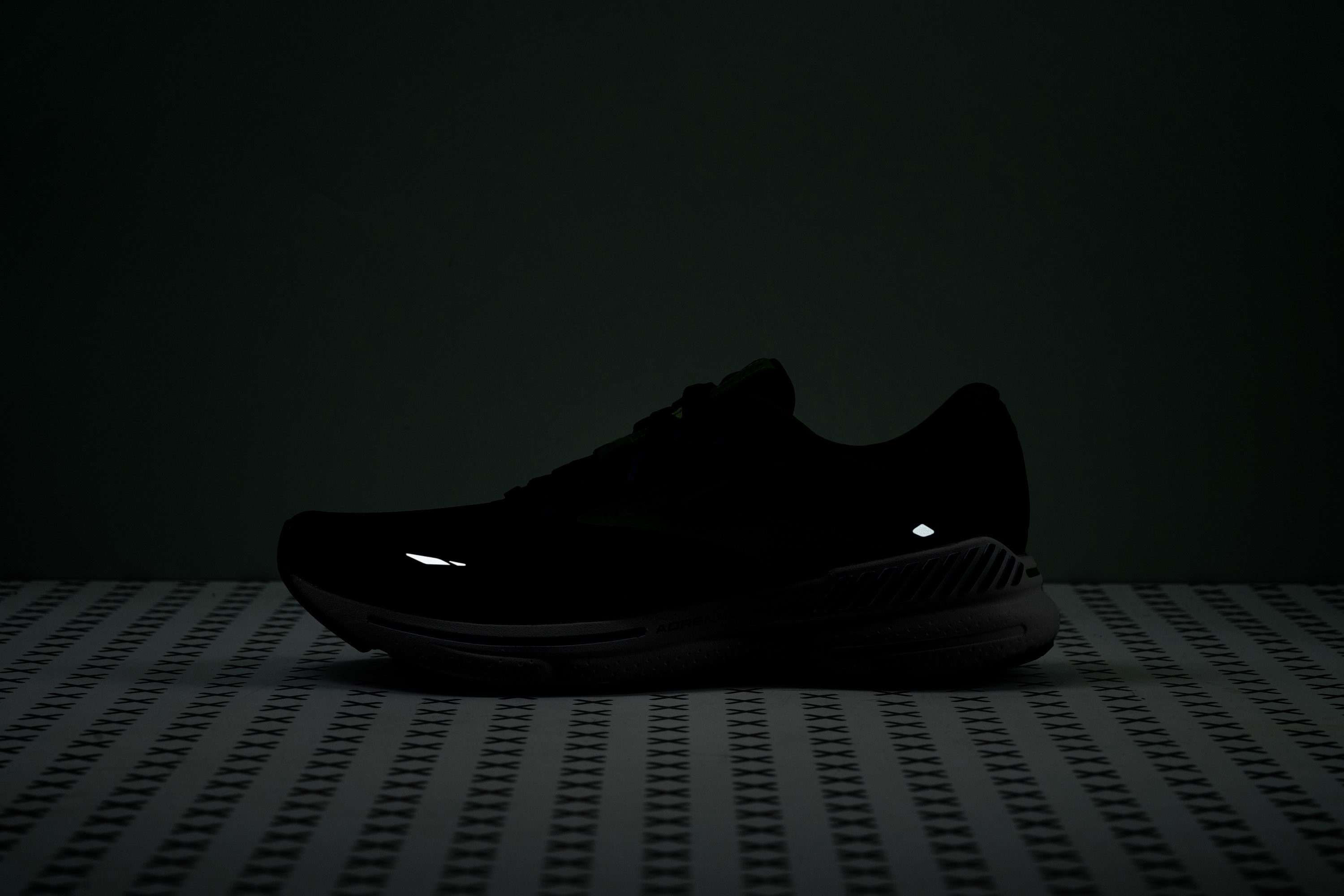
| Adrenaline GTS 23 | Yes |
Tongue padding
Fans of padded tongues—maybe because they often experience lace bite or need to tighten the knots a lot—will find this to be an amazing shoe in that regard.
Brooks went all out, and as can be seen in the picture, they added not just one, but two layers of padding into the tongue for an incredible thickness of 11.7 mm.
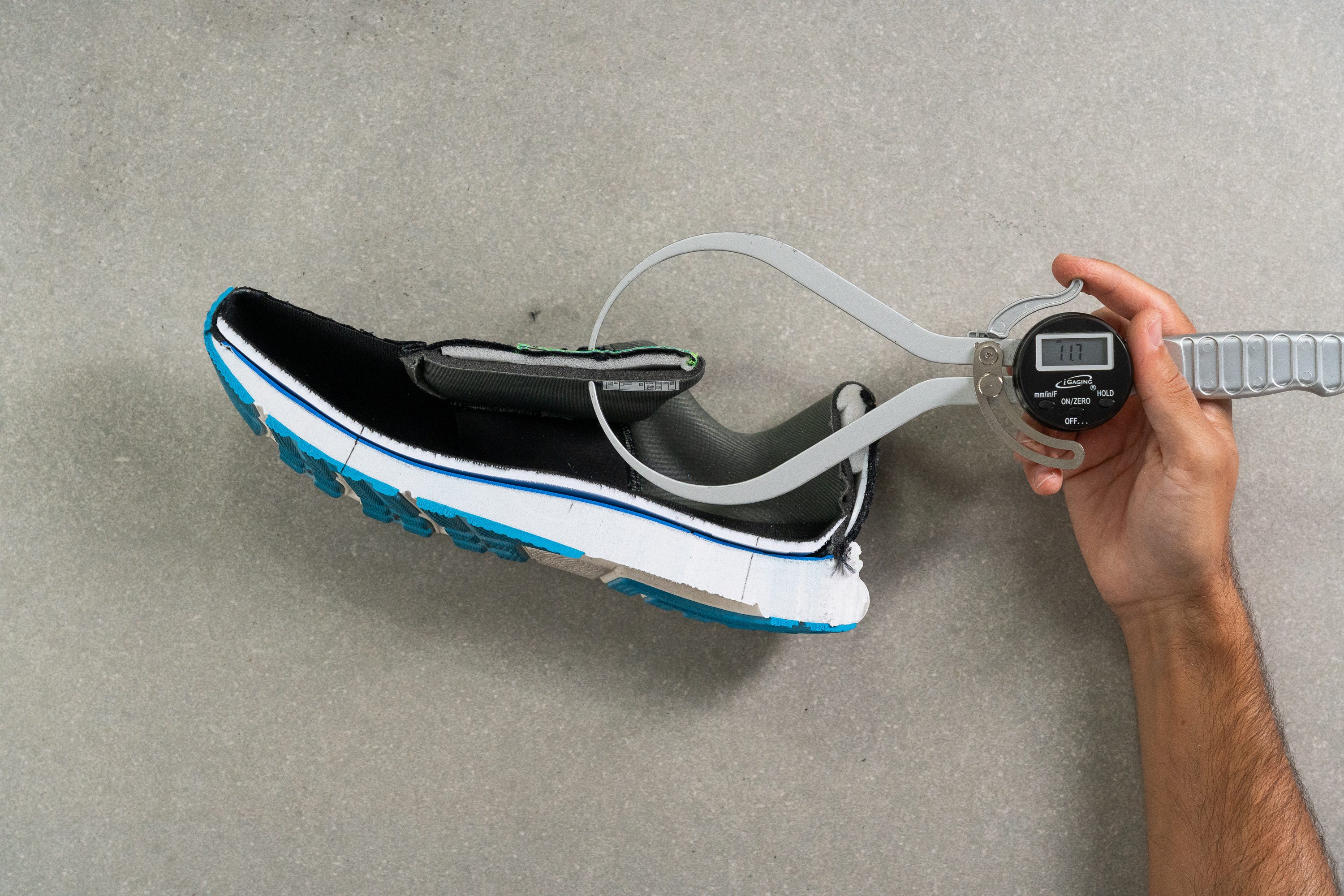
| Adrenaline GTS 23 | 11.7 mm |
| Average | 5.7 mm |
Tongue: gusset type
Striving for a good balance between comfort and solid lockdown, the tongue of this shoe is semi-gusseted. We believe that's the right approach for this type of shoe.
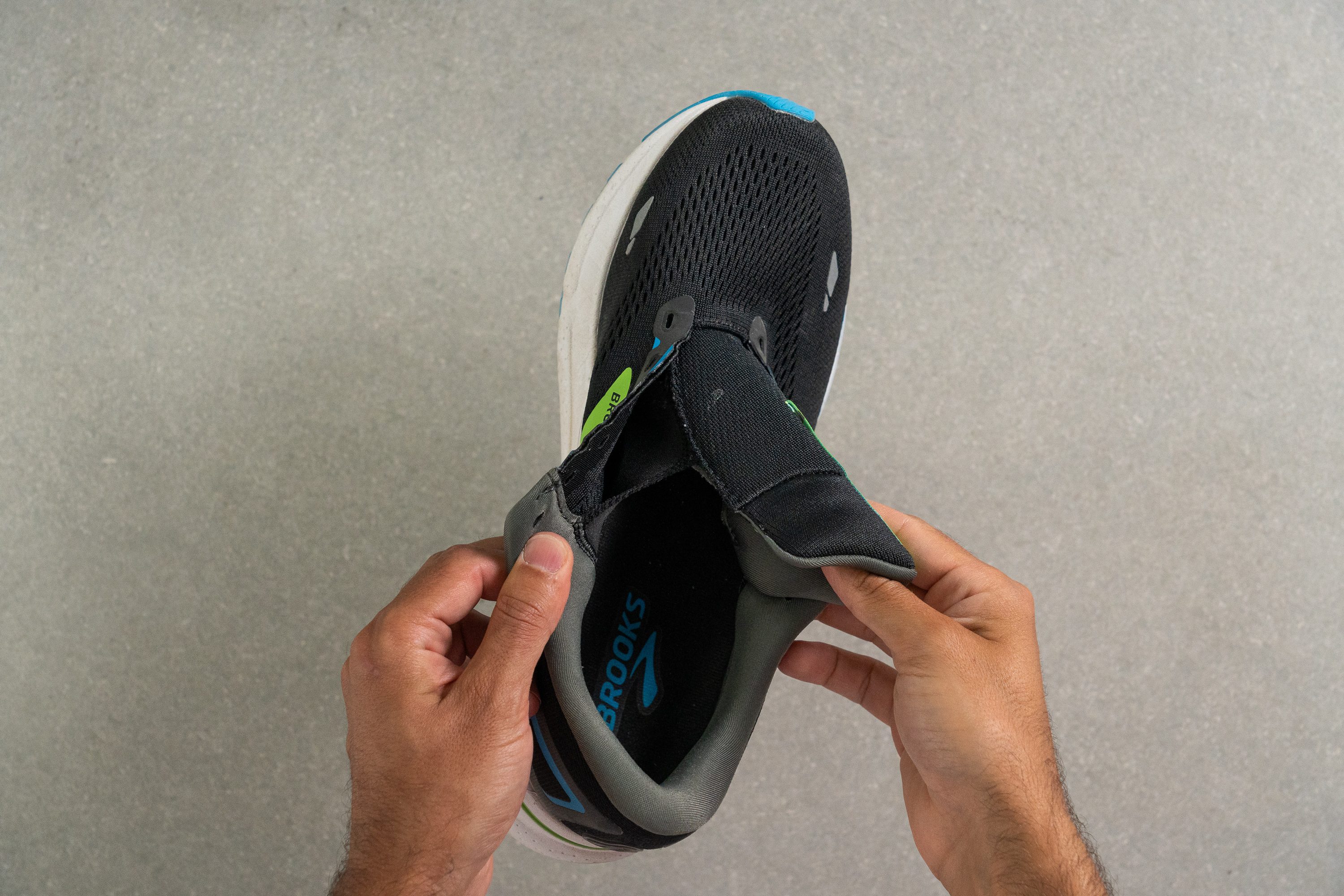
| Adrenaline GTS 23 | Both sides (semi) |
Heel tab
Brooks is one of those brands that consistently skips adding heel tabs to their shoes, and they've proven it yet again.
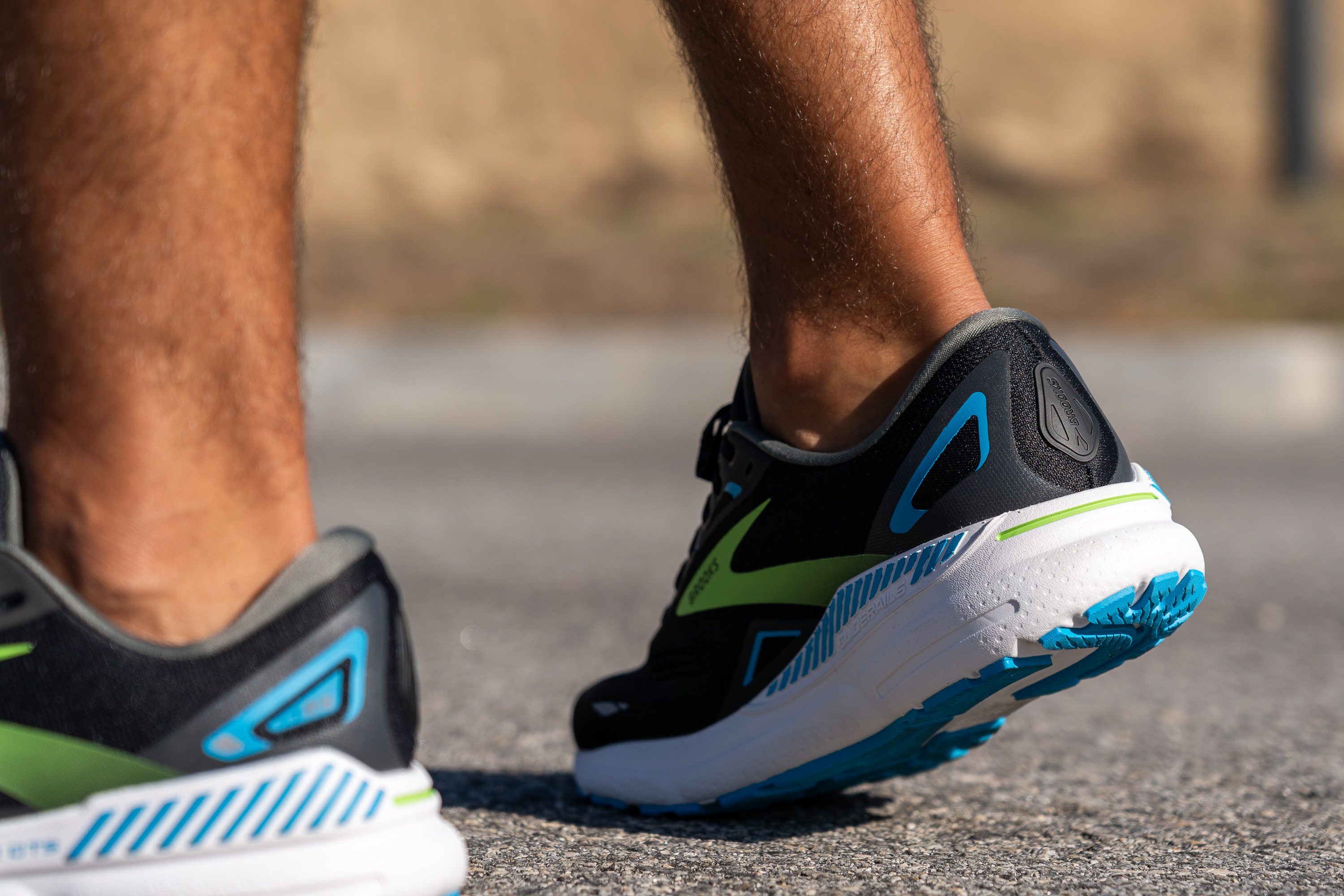
| Adrenaline GTS 23 | None |

